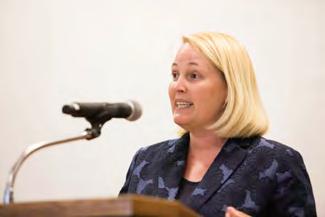














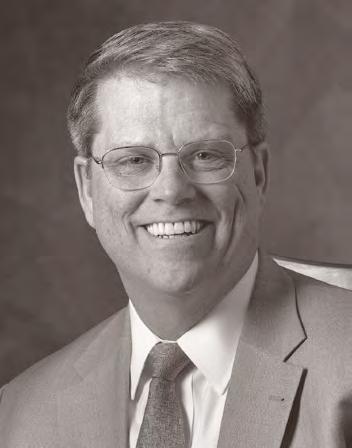
Over the past seven years, I have focused almost all my thoughts and energy on the goal of fulfilling President Dallin H. Oaks’s charge to the charter class in 1973 to make the byu Law School great. Now, as I complete my service as dean of the Law School, I am pleased to report that by any reasonable measure, byu Law has become a great law school. Whether you examine faculty influence, student credentials, bar passage, graduate placement, low graduate indebtedness, library resources, or myriad other factors, byu Law School is one of the finest law schools in the United States.
While we recognize that every ranking system has shortcomings, we were pleased that the Law School was recently ranked no. 22—its highest ranking ever— in US News & World Report’s 2023–2024 Best Law Schools. Although the methodology for these rankings changed dramatically from last year, which jumbled the rankings of some law schools quite significantly, we remained steady because we emphasize excellence in all aspects of our operation. Just for fun, I tracked down the claimed founding dates of every law school in the top 25 of these most recent law school rankings. byu Law is by far the youngest law school on the list. In fact, only four top-25 law schools were founded after the 1800s. The next-youngest school is ucla , which was founded in 1949—24 years before byu The only other law schools founded after the 1800s are usc (1900), Chicago (1902), and Florida (1909).
We are also proud that byu Law remained preLaw magazine’s “Best Value Law School” for the second consecutive year. This comes as no surprise to me because our students routinely graduate with the lowest level of indebtedness in legal education—a combination of low tuition (thanks to our sponsoring institution, The Church of Jesus Christ of Latter-day Saints), generous scholarships enabled by a healthy endowment, continuing contributions managed by our Office of External Relations, and the careful oversight of our controller’s office.
As we approach our 50th anniversary—our quinquagenary—I invite all those faculty, staff, students, alumni, and friends who have contributed to building this great law school to celebrate its resounding success.
The Law School began with a modest faculty of six in 1973. We now have a diverse group of over 30 faculty, many of whom are already leaders in their respective academic fields and others who are rising stars. This summer we are thrilled to welcome Shima Baughman, Thomas Lee, and Kevin Worthen back to the faculty after their respective terms as a faculty member at the University of Utah S. J. Quinney College of Law, a justice on the Utah Supreme Court, and president of byu. In addition, Catherine Bramble will join the full-time faculty this fall as a writing skills specialist. The faculty of the Law School continues to expand in stature and influence.
Dur ing my tenure, dramatic changes in the administration of the Law School have improved our agility and effectiveness. We have adjusted to new student expectations and new market realities to provide meaningful support to our students. The Office of Student Affairs, for example, manages the Law School’s new Academic Development Program, which has been largely responsible for increasing our first-time bar passage by more than 10 percentage points over the past several years. Last year, aided by the dedicated members of our revamped Career Development Office, our student employment rate 10 months after graduation ranked sixth in the country. byu Law students are also blessed, though in less measurable ways, by our highly skilled Communications Office, excellent librarians, knowledgeable information technology specialists, and devoted staff members.
Of course, the students themselves deserve much of the credit for their own successes. Vetted by our conscientious team in the Admissions Office, the incoming class of 2026 has the best lsat scores and gpas for any class we have ever admitted, placing our students comfortably within the top 20 law schools in the United States in terms of admissions qualifications. Our students are hardworking and creative, and they are taking advantage of a program of legal education unrivaled in its combination of rigor and innovation. This past spring, for example, almost all our first-year students participated in one of our nine Academies, which we offer in partnership with leading law firms around the country. Second- and third-year students took advantage of other opportunities, including our Civil Rights Study Tour, Washington Law Seminar, Jerusalem Program, and Global Law Seminars in London, Geneva, and Dubai. As we expand our influence, we expect to place additional students in Global Law Seminars in Mexico City and Seoul during the coming year.
As is evident from these programs, we are extending our reach as a global law school. During the past academic year, I visited England, Japan, Korea, Mexico, Kenya, Tanzania, Zambia, and the Democratic Republic of Congo to explore the expansion of our Global Law Seminars, recruit students for our llm program, and support and create chapters of the J. Reuben Clark Law Society. In addition, the International Center for Law and Religion Studies continues to host conferences and influence the course of religious-liberty work around the world.
By the time you read this, we will have a new Law School dean, so I will take this opportunity to say a few final words about my hopes for the Law School. In my Law and Leadership Colloquium this past semester, I assigned the students a team project to develop an action plan describing how byu Law School can become a pacesetter in leadership education. Two of the groups— inspired by President Russell M. Nelson’s address entitled “Peacemakers Needed” in the most recent general conference of The Church of Jesus Christ of Latter-day Saints— proposed a program on peacemaking. One of the groups wrote: “In a career field founded on adversity, we believe we can find ways to be peacemakers in our various fields and emulate the Savior in our unique position at byu Law by learning peacemaking skills while in law school.” The other group offered a similar reflection: “The legal profession’s adversarial nature creates the need for peacemaking professionals who unify divided groups and generate solutions to the most contentious issues. byu Law has a special mission to learn from and become more like the Savior; in doing so, we must create peacemakers.” These aspirations for the legal profession are profound and reflect student commitment to the Law School’s
mission statement, which reads in part: “We are committed to the teachings of Jesus Christ and honor His many roles, including . peacemaker.”
As we look to the future, I hope we can continue to refine the unique mission of byu Law to better reflect our commitment to the teaching of the gospel of Jesus Christ. My hope is that byu Law will someday lead the legal profession by training peacemakers guided by President Nelson’s promise that “the best is yet to come for those who spend their lives building up others.” When I heard President Nelson speak about peacemaking, the Spirit confirmed the wisdom of his counsel for me and inspired me to ponder peacemaking and to act on his promises. I hope that we can become a community of peacemakers.
d. gordon smith
Dean, byu Law School
I hope we can continue to refine the unique mission of byu Law to better reflect our commitment to the teaching of the gospel of Jesus Christ.
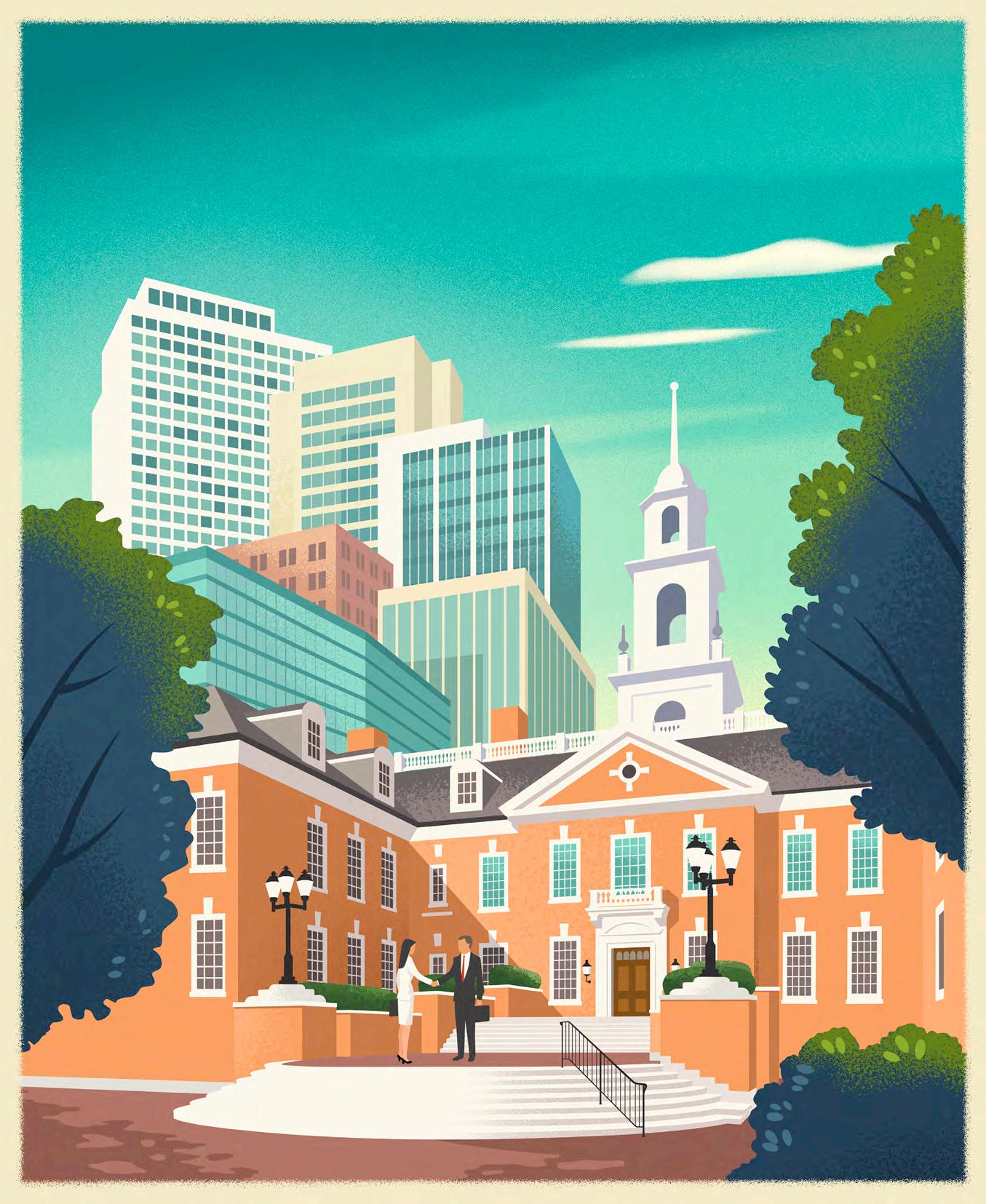
byu Law students want to be in Delaware, and Delaware wants byu Law students.
BY MATTHEW JOHNSON, ’23Seven byu Law graduates will be clerking for judges in Delaware during the 2023–24 term. Additionally, several others will be joining law firms in Delaware as first-year and summer associates. While byu Law is sending more graduates to Delaware this year than ever before, the byu Law–Delaware pipeline is far from new: the school has been producing Delaware lawyers for years. Despite being the second-smallest state geographically, Delaware is a huge player in the world of corporate law. More than 60 percent of Fortune 500 companies are incorporated in Delaware. Additionally, over 90 percent of all initial public offerings in the United States are registered in Delaware. And investors are simply willing to pay more for Delaware corporations than for similar companies incorporated in other states.
The Second Industrial Revolution during the late 1800s dramatically changed business in the United States. Previously, the American economy was built almost exclusively on small, closely held, and often family-owned businesses. But technological innovation fueled the expansion of small businesses into manufacturing powerhouses. These businesses could not provide the capital or infrastructure necessary to create the large manufacturing plants they needed, so they began exploring entity forms that would accommodate this growth. Growing businesses increasingly turned to incorporation.
Many states recognized an opportunity to generate economic benefits for their citizens and capture potential revenue by being considered friendly to these growing corporations. The race was on to become a corporate haven for the nation’s largest companies. New Jersey was the first to establish itself as a corporation-friendly state. New Jersey’s legislature
enacted clear regulations that not only outlined what was required for companies to become corporations in the state but also gave these corporations additional benefits such as indefinite existence and the ability to own other corporations. This legislation was widely recognized as the best corporate law in the nation, and similar law was adopted by several other states, including Delaware.
But in the early 1900s, New Jersey’s stronghold began to erode when its governor, future United States president Woodrow Wilson, signed several bills that imposed limitations on New Jersey corporations. This perceived attack on corporations caused many companies to flee New Jersey and flock to Delaware, where regulations remained friendly to corporations. Delaware suddenly had hopes of cementing itself as the leading state for corporate law.
Over the course of the next century and a half, Delaware continued to respect the corporate form and has worked to ensure that its corporate legislation remains predictable and logical. Delaware has maintained its position at the forefront of corporate law in large part due to its specialized judiciary. The Delaware Court of Chancery and the Delaware Supreme Court are both globally renowned for their expertise in handling corporate legal disputes. Additionally, because of the high number of incorporations in Delaware, the United States Bankruptcy Court for the District of Delaware is composed of some of the most capable restructuring attorneys in the nation.
Business lawyers, corporate executives, and scholars all monitor Delaware court decisions closely because disputes involving most of the world’s largest and most prominent corporations are litigated in Delaware courthouses. The Court of Chancery draws particular interest because it operates as a court of equity and does not involve juries. Instead, each of its seven expert jurists render decisions based on their extensive background in corporate practice and their deep knowledge of Delaware case law.
Law students across the nation study Delaware courts to learn corporate law because these courts render the most significant corporate law decisions, including rulings on corporate compliance, corporate board members’ fiduciary duties, and rights of shareholders. Wellknown Delaware court decisions are often referred to in shorthand, including the seminal cases Unocal, Revlon, and Blasius. Although Delaware’s popularity is discussed almost exclusively in legal and corporate circles, the impact of Delaware law is felt by people around the world. Indeed, Delaware litigation has made global headlines in 2023 with high-profile cases involving Tesla, Twitter, and Fox News. Delaware continues to be at the forefront of corporate law, and the state leads the nation in regulating corporations. Anyone interested in corporate law is interested in what happens in Delaware.
Considering Delaware’s expert judiciary, sophisticated bar of corporate lawyers, and well-developed body of business case law, it stands to reason that businesses will continue to seek incorporation there; it is a state that offers certainty, transparency, and equity in dealing with corporate law disputes.
byu Law is well equipped to prepare and place students in the field of corporate law. US News & World Report ranked byu Law’s business/corporate law program 17th nationwide for 2023–24, and the Law School has 15 faculty members and research fellows teaching and researching in business law topics. In 2022, byu Law launched its Global Business Law Program, which brings the Law School’s research to bear on a variety of issues around the world and opens new student opportunities. byu Law’s faculty, curriculum, and extracurricular activities (especially the Winter Deals Conference and the Law Academies Program) create unique opportunities that expose students to corporate law in Delaware and open the door for graduates to begin careers there.
The impact of Delaware law is
byu Law dean D. Gordon Smith was a corporate lawyer in Delaware at Skadden, Arps, Slate, Meagher & Flom llp prior to his pivot to academia. Dean Smith’s practice and scholarship have focused on corporate law, specifically on Delaware law. Additionally, byu Law professor Matthew Jennejohn clerked in Delaware for Leo E. Strine Jr., a vice chancellor on the Delaware Court of Chancery at the time, and he has spent his career studying and practicing corporate law. In past years, Dean Smith and Professor Jennejohn had frequently discussed the value of practicing law in Delaware and the possibility of a Delaware pipeline for the many byu Law students intending to practice corporate law. This pipeline came to life as Dean Smith and Professor Jennejohn identified students who demonstrated an aptitude for corporate law and were deciding where to begin their legal careers. The two then helped these students make meaningful connections with members of the Delaware judiciary and prominent members of the Delaware Bar. Many of these connections turned into summer associate offers, and many of the summer associate offers turned into jobs.
In addition to maintaining a distinguished faculty with ties to Delaware, byu Law has pioneered a robust corporate law curriculum. Although law schools have long offered skills courses geared toward litigation, including trial advocacy and appellate brief writing, byu Law was among the first to introduce classes that develop students’ corporate skills. In 2015, byu Law welcomed Curtis Anderson to its faculty. Professor Anderson had practiced as a corporate lawyer for many years both in private practice as a partner at Baker Botts llp and as general counsel for the online dating company Match Group. Upon arriving at byu Law, Professor Anderson developed a curriculum to teach transactional drafting and added courses focused on acquisitions and entity organizations. Professor Anderson also created community clinics that allow students to work with clients with real businesses, advise startup companies, and draft corporate documents. These corporate experiences provided at byu Law have further prepared byu Law graduates to become corporate lawyers.
byu Law also holds an annual Winter Deals Conference, which brings leading scholars and practitioners to Park City, Utah, to present research on the legal institutions that support contemporary markets. The conference is organized by professors William Clayton, Matthew Jennejohn, and Gladriel Shobe, as well as Dean Smith, all of whom have extensive experience both practicing and studying corporate law. The Winter Deals Conference includes a keynote address focused on the development of corporate law; several members of the Delaware judiciary have participated as keynote speakers, including chancellor Kathaleen St. J. McCormick and vice chancellors Sam Glasscock III, J. Travis Laster, and Lori W. Will. The conference provides a forum for the nation’s leading corporate practitioners and scholars to discuss developments in the laws that govern many of the world’s largest corporations. byu Law is fortunate to have the corporate experts and resources to lead discussions in the world of corporate law.
byu Law has collaborated with law firms across the globe to offer weeklong academies in which small groups of rising 2Ls engage in boot camp–style trainings and simulations in a variety of practice areas. Each of these academies is organized by a byu Law faculty member with expertise in a particular area of law. Notably, several of these academies focus on corporate law.
This past year a group of 12 byu Law students, led by Professor Clayton, worked in the New York City offices of Kirkland & Ellis llp while another group of 12, led by Dean Smith, worked in the Palo Alto offices of Wilson Sonsini Goodrich & Rosati. Both groups participated in simulations that required drafting, negotiating, and other essential corporate
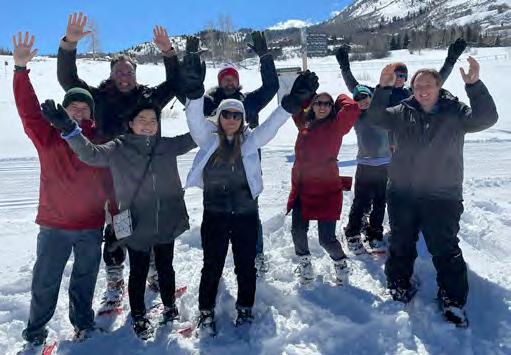
felt by people around the world.
law skills. Another academy, held in the Philadelphia office of Greenberg Traurig llp and led by Professor Brook Gotberg, focused on corporate restructuring and bankruptcy. The Philadelphia academy included a trip to Delaware to see corporate restructuring at work in the Delaware courts.
In addition to these academies focused on corporate law, 10 students also participated in the first Delaware-specific academy, sponsored by Potter Anderson & Corroon llp and led by Professor Jennejohn. These academy experiences have informed many participants’ decisions to pursue a career in corporate law and have also led many students to consider the Delaware legal market.
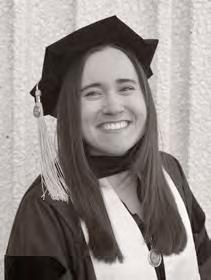
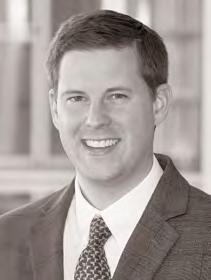
The byu Law–Delaware pipeline is real. byu Law has successfully placed students into Delaware judicial clerkships for several years; this year’s nine clerks in Delaware is the highest number in school history. As byu Law alumni continue to land at the biggest Delaware firms and clerk on almost every Delaware court, they become valuable resources for students interested in corporate law. Current byu Law students are increasingly able to reach out to alumni to discuss their experiences in Delaware and ask for guidance on securing employment in a competitive market.
While byu Law students and graduates seek opportunities in Delaware for many reasons, they all recognize that the state offers a legal experience unlike any other, and they appreciate the welcoming community of Delaware lawyers as well as the Delaware lifestyle. The nine students and graduates heading to Delaware this year agree: for corporate law, the First State is the place to be. a
Reece Barker, ’22, is a litigation associate at Potter Anderson & Corroon llp in Wilmington, Delaware, and is an incoming clerk for Chief Justice Collins J. Seitz Jr. of the Delaware Supreme Court. Reece studied accounting before coming to byu Law. He chose to begin his career in Delaware because of the highquality corporate work and the exceptional caliber of lawyers there. Reece is putting down roots in Delaware. He recognizes that “not only is Delaware a great place to start your career, but it is a great place to have your career.”
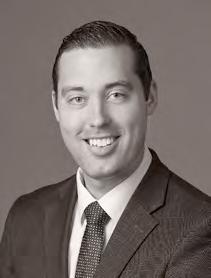
Aaron Anderson, ’23, is an incoming clerk for Judge Kent A. Jordan of the US Court of Appeals for the Third Circuit. Before coming to byu Law, Aaron earned degrees in accounting and taxation and worked for two years at PricewaterhouseCoopers llp, a global accounting firm. Aaron’s accounting background led him to pursue career opportunities that would leverage both his law degree and his business experience. “I wanted to keep all of my options open in the corporate world, and Delaware and New York City are the two places to do that,” he says. And because of the Third Circuit’s appellate jurisdiction over Delaware, Aaron knew that clerking on the Third Circuit could potentially provide him with opportunities to work on important corporate law cases. Aaron will clerk for Judge Jordan for a year in Delaware before moving to New York City to practice law at Cravath, Swaine & Moore llp.
Jamie Bjazevich, ’23, is an incoming clerk for Chief Judge Colm F. Connolly of the US District Court for the District of Delaware. Jamie, an aspiring patent litigator, was attracted to Delaware because of “the significant patent litigation that occurs in the US District Court for the District of Delaware.” As a result of so many corporations calling Delaware home, many of the nation’s most sophisticated patent cases are filed and litigated in Delaware. And several members of the Delaware judiciary are former patent litigation specialists, including Judge Kent A . Jordan of the Third Circuit and Magistrate Judge Jennifer L. Hall of the District Court. Delaware offers expertise in more than just corporate law to those who train and pursue careers there.
William Emery, 3L, is an incoming summer associate at Potter Anderson & Corroon llp in Wilmington, Delaware. William discovered Delaware’s unique legal market when he met with Potter Anderson attorneys at byu Law’s Winter Deals Conference during his 1L year. byu Law’s strong corporate law–oriented academic offerings, including Business Organizations with Professor Clayton and Securities Regulation with Professor Jessica Lees, further confirmed his interest in corporate law and his aspiration
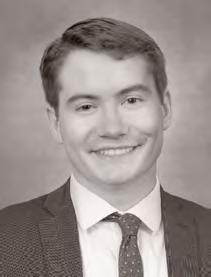
to clerk on a Delaware court. William looks forward to working in Delaware this summer and hopes to return when he graduates from byu Law.
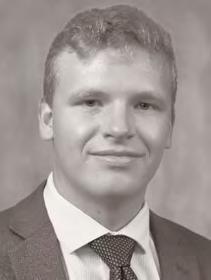
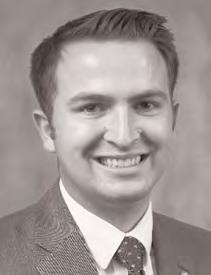
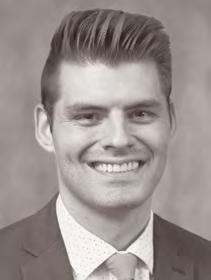
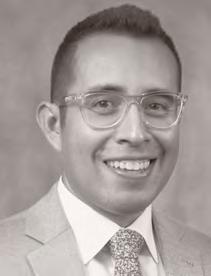
Jonathan Garcia, ’23, is an incoming clerk for Justice Gary F. Traynor of the Delaware Supreme Court. While in law school, Jonathan had the opportunity to extern for Vice Chancellor Nathan A. Cook on the Delaware Court of Chancery. In the process, Jonathan settled his intention to practice corporate law. He says he “was attracted to Delaware by the sophistication of the legal work and the centrality of Delaware in the world of corporate law.” Jonathan recently served as a teaching assistant for byu Law’s inaugural Chancery Academy, preparing participants to learn from speakers such as Vice Chancellor Cook during the simulation orientation and encouraging students to explore the unique corporate law opportunities in Delaware. Jonathan is well prepared for his clerkship and beyond and will be an approachable resource for future byu Law students.
Matthew Johnson, ’23, is an incoming clerk for Vice Chancellor Nathan A. Cook of the Delaware Court of Chancery. Matthew graduated with a joint JD/MAcc degree, so he knew coming into law school that business law was likely his ultimate destination. Matthew began to consider opportunities in Delaware during his 1L contracts course as Professor Jennejohn shared stories about his experience clerking on the Delaware Court of Chancery. As class discussions highlighted Delaware’s role in the corporate world, Matthew saw the value of beginning a corporate law career in Delaware. He externed for Vice Chancellor Joseph R. Slights III in his final term on the bench, which solidified Matthew’s commitment to corporate law and the work of the Delaware judiciary. Matthew was fortunate to receive an offer to clerk on the Court of Chancery, and he looks forward to the experience.
Blake Lawrence, ’23, is an incoming associate at Potter Anderson & Corroon llp in Wilmington, Delaware. Blake earned both his bachelor’s and master’s degrees in accounting and worked for Deloitte, an international accounting firm, before coming to byu Law. With his business background, Blake knew he wanted to return to the corporate world after law school. When asked, “Why Delaware?” Blake’s answer was that he is “interested in a career with a strong corporate practice. Delaware offers big-city corporate work with a smallcommunity feel.”
Stephen Loertscher, ’23, is an incoming clerk for Magistrate Judge Jennifer L. Hall of the US District Court for the District of Delaware. Stephen fell in love with antitrust law during his final year of law school. Because antitrust law deals with large corporations and large corporations are predominantly incorporated in Delaware, Stephen identified Delaware as an ideal place to practice law. He looks forward to beginning his legal career at “the heart of American corporate law.”
Ethan Sulik, ’23, is an incoming clerk for Chief Judge Laurie S. Silverstein on the US Bankruptcy Court for the District of Delaware. Earlier, Ethan had the opportunity to extern for Vice Chancellor Nathan A. Cook on the Delaware Court of Chancery. Ethan cites the sophistication of the corporate work in Delaware and the appeal of being on the East Coast as Delaware’s main draws. His appreciation for Delaware grew when he was a summer associate at Potter Anderson & Corroon llp, where he worked on both bankruptcy and corporate litigation projects. He happily accepted a clerkship position with Judge Silverstein in order to develop his bankruptcy expertise. He looks forward to returning to Delaware with so many classmates.
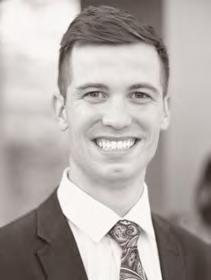
 PHOTOGRAPHY BY BRADLEY SLADE
By Martha L. Minow 300th Anniversary University Professor at Harvard University and Former Dean of Harvard Law School
PHOTOGRAPHY BY BRADLEY SLADE
By Martha L. Minow 300th Anniversary University Professor at Harvard University and Former Dean of Harvard Law School
give thanks to Dean D. Gordon Smith for the invitation to come here to give this lecture and to Judge Thomas Griffith—my pen pal over many years— for helping to make this possible. It is a particular honor to salute Bruce Hafen, whose scholarship has played a prominent role in my teaching and writing—even when we have not agreed. That example of constructive disagreement guides my remarks here.
Americans are deeply divided. I wish it were not the case. The belief that we are divided is perhaps one of the few things that Americans currently have in common.1 Rather than bringing us together, the pandemic has increased divisions—over masks, vaccines, and whom to trust. Eighty-one percent of Americans believe we are more divided now than we were before covid -19.2 Many fear that their ways of life, their beliefs, or their very existence is at stake.
The place of religion in public life, including exemptions from legal rules sought by religious individuals and institutions, has become a lightning rod for contemporary American conflicts. There has always been a tension between religious freedom and the demands of public order, just as there is enduring difficulty in preserving pluralism where individuals and groups have diverging views founded on religious and conscientious beliefs. Respect for individuals’ consciences and for the free exercise of religion is pivotal within the American constitutional tradition—yet unbounded deference and resulting exemptions granted even to sincerely held religious claims could destroy vital public policies and laws.3 And the core American commitment to equal treatment of individuals and combatting discrimination and exclusions based on individuals’ immutable characteristics also is paramount in American law and ethos.
These tensions are manifest in concrete situations. What can and what should happen when an employee posts a gay-affirming poster and an employer responds by posting Bible verses, or when a consumer is turned away from a retailer who cites religious convictions, or when an employer asserts religious objections to covering health care benefits for services contrary to the employer’s sincerely held beliefs?4 What should happen when commitments to religious liberty and to equal treatment conflict?5 Sharp disagreements now arise even over how different sides of issues are framed or called. Is it, for example, constitutional free exercise of religion or forbidden discrimination? Equal treatment or discrimination against religious social services? Coerced speech or public accommodation? These disagreements span constitutional, statutory, and administrative laws in national, state, and local settings; they permeate private as well as public spaces—from schools and hospitals to the internet.

Polarizing framings of the disputes and politicized judicial appointments can upend decades of judicial precedents and prompt even more social division. Flash points include treatments of gender, sexual orientation, or gender identity.6 A recent poll shows white Evangelical Christians reporting greater fears than any other group about what they perceive as threats to American culture.7 Because opponents often find ample legal resources, these clashes occupy courts in cases involving the scope of public accommodation laws, civil rights in employment and education, status of families, and health care policies. Disagreements over framing appear in competing news outlets, as one may describe the constitutional freedom “to think freely and speak freely” while another calls it a “new faith-based right to discriminate.”8
The distinctively American reliance on litigation exacerbates conflicts by treating them as winner-takeall disputes.9 When coupled with politicized divides, the escalating use of courts to resolve differences over issues of religious freedom
and equal treatment intensifies social division and can render actual solutions remote.
It is not an exaggeration to note that these ingredients—disagreements over religion and debates cast such that only one side can prevail—lead to violence and war. “[V]oices from the seventeenth century . offer a warning of the dangers of entrusting power to those who feel summoned by God to war, or [who] feel that their sense of justice and order is the only one valid,” concluded historian Peter Wilson in his history of the devastating Thirty Years’ War that killed millions, including a quarter of the German people, and destroyed communities across Europe.10 Religion itself is not the problem; self-righteous imposition on others can stem from secular beliefs as well. How can laws, institutions, and even conversations set us on a path toward mutual recognition rather than greater conflict?11
A f ew examples of current, intense disputes framed as all-or-nothing contests highlight the difficulties courts face where competing interests of religious freedom and antidiscrimination are at stake.
303 Creative LLC v. Elenis, 12 recently argued before the Supreme Court, involves website designer Lorie Smith’s desire to create websites celebrating heterosexual marriages but not same-sex marriages because doing so would be inconsistent with her sincerely held religious beliefs. Colorado law forbids businesses deemed “public accommodations” from refusing to serve an individual or group on the basis of individual characteristics, including sexual orientation, and from communicating that an individual’s patronage would be treated as “unwelcome, objectionable, unacceptable, or undesirable” because of the individual’s identity.13
Ms. Smith challenged the law under free speech and religious exercise clauses of the First Amendment. A divided panel of the federal Court of Appeals for the 10th Circuit ruled against Ms. reasoning that the state law was general, neutral, and narrowly tailored to achieve
Colorado’s compelling interest in ensuring equal access to publicly available goods and services.14 The US Supreme Court granted review, reviving questions left unanswered by Masterpiece Cakeshop v. Colorado Civil Rights Commission, 15 which involved a baker who refused to make a wedding cake for a same-sex wedding. The Supreme Court found for the baker due to evidence that the Colorado Civil Rights Commission showed hostility to the baker’s religious beliefs, but the Court reached this result without providing guidance for resolving conflicts between the First Amendment and antidiscrimination laws.16
The intersection of religious belief, free speech, and antidiscrimination norms raises many questions. A critic of Ms. Smith asks, Is it solely a matter of free speech, however, if a store posts a sign saying, “Wedding cakes for heterosexuals only”?17 Or a sign saying, “We Distrust Blacks”? Further questions include: Is refusal to serve individuals seeking services related to a same-sex marriage discrimination on the basis of sexual orientation? And does a state have a compelling interest to protect people against discrimination and exclusion on the basis of sexual orientation? And should the law focus on the practical effect of asserted exemptions from civil rights protections?
In s ome ways, the case seems fundamentally a contest over endorsements. Should the government endorse religious pluralism, even when it entails discrimination against those seeking a same-sex marriage? 18 Or should the government endorse lawful same-sex marriages despite religiously guided opposition to that practice? These are difficult questions, and they are not the only flashpoints of religionbased legal contention in our nation.
YU PRIDE ALL. V. YESHIVA UNIV.
Private religious educational institutions can also become the locus of conflict when the treatment of students or teachers as a result of religious beliefs is alleged to violate public accommodation laws or employment laws against discrimination. This is what happened when Yeshiva University, based in New York City, refused to recognize a “Pride student club.19
A state trial judge
rejected the university’s claim that it was shielded by an exemption for religious corporations under New York City’s public accommodations law because the university had been chartered for educational purposes.20 The court also rejected the university’s assertion of free exercise of religion rights and directed the university to recognize the club and give it the same access to resources accorded to other student clubs. The US Supreme Court declined the request for a stay of the New York court’s order.21 Further review is underway.
TASSINARI V. SALVATION ARMY NAT’L CORP. Perhaps there has been no more vituperative area generating these clashes, however, than health care and religious accommodations. Political contests over abortion and contraception reflect and amplify the positions of some religious groups and also influence fundraising, judicial appointments, and legal developments.22 End-of-life treatment, hiv treatment, and gender-affirming care can also trigger religious accommodation claims. The coverage and antidiscrimination provisions of the Affordable Care Act, for example, have prompted many issues for some religiously affiliated health care providers and employers responsible for employee benefits. Because the United States relies heavily on private employers for providing health care coverage and because many employers and health care providers have religious affiliations, there are many potential religiously informed objections to public policies governing reproduction, end-of-life, and other health care matters.
Tassinari v. Salvation Army Nat’l Corp. is a recent class action lawsuit on behalf of individuals with opioid use disorder, classified as a disability protected by federal law.23
The Salvation Army’s nationwide network of adult rehabilitation facilities provides services for individuals with substance use disorders, but a Massachusetts Salvation Army shelter representative refused to offer medication for opioid use disorder because of the organization’s long-standing objections to the use of such medications.24 A federal district court rejected the Salvation Army’s effort to dismiss the suit and proceedings continue.25

Simil ar issues related to health care were raised in a suit brought by a Texas


employer in federal court under the Religious Freedom Restoration Act. 26 Braidwood Management Inc. objected to coverage of an hiv prevention drug as required under the Affordable Care Act.27 The federal court in this case found that the government failed both to show how the mandate furthered a compelling government interest and to show how the mandate was the least restrictive means of furthering that stated interest. More legal challenges in the health care area are likely in response to the New Proposed Rule Making announced by the Department of Health and Human Services that would interpret the Affordable Care Act provisions that prohibit discrimination “on the basis of sex” to cover abortions and gender transitions within the health care providers’ offered services.28
By criticizing the dominance of litigation in framing religious freedom and equal treatment issues, I do not mean to revive largely debunked claims that Americans are now more litigious than in the past or more litigious than people in other nations. 29 Yet Alexis de Tocqueville’s observation of over 150 years ago remains resonant: “Scarcely any political question arises in the United States that is not resolved, sooner or later, into a judicial question.”30 Defenders of our adversary system admire it for diverting and narrowing conflicts, for affirming individual dignity, and for pursuing truth. Critics point to the risks that the judge is biased or incompetent or that the parties are not equally matched in talent and resources.31 Litigation also pushes disputes into a bipolar framework, even though court rules allow third parties and friends of the court to weigh in.32
Deep er concerns question litigation’s suitability for matters that “are not susceptible to a binary (i.e., right/wrong, win/lose) conclusion or solution”33 and its reliance on categorical solutions that miss opportunities for accommodating competing, valid claims.34 Professor Mary Ann Glendon, who has written extensively in support of banning abortion, has observed that “[a] tendency to frame nearly every social controversy in terms of a clash of rights (a woman’s right to
her own body vs. a fetus’ right to life) impedes compromise, mutual understanding and the discovery of common ground.”35 In the context of intensive disagreements over religious and equality claims, a better approach would acknowledge the power of competing commitments and also focus on how conflicting groups can peacefully coexist over time in a pluralistic society of shared situations, conflicts, and fates.36 “Better” here also means devising approaches to conflicts that attend to risks of social cleavage and violence and to choices about preserving the integrity of religions and maintaining coherent public policies.
Historical and comparative accounts demonstrate the costs and challenges of failing to negotiate religious differences in democratic societies.37 Failing to negotiate solutions has real costs even beyond the particular conflicts over religious exemptions. For example, some societies may react to religious claims by enacting secularism, imposing increasing state control impinging on religious expression outside the home, while others embrace one sect or a limited number of religions to the detriment of religious freedom and perhaps to democracy itself.38 The alternative in jeopardy is preservation of religious diversity as a public good, with more accommodation of minority religious views or practices.39
A ccommodation need not involve abandonment of principle, particularly if it proceeds with acknowledgment and celebration of multiple values and commitments. For example, providing accommodation for an individual whose religious commitments otherwise conflict with an official dress code or work schedule serves the greater good of respecting individual freedom. Even when accommodation requires compromise, it can be defended in service to the greater goods of peaceful coexistence and mutual respect across diverse groups. This, in no small respect, is a foundational principle of the United States.
President George Washington stated,The establishment of our new Government seemed to be the last great experiment, for promoting human happiness, by reasonable
compact, in civil society. It was to be, in the first instance, in a considerable degree, a government of accommodation as well as a government of Laws. Much was to be done by prudence, much by conciliation, much by firmness.40
This spirit of accommodation, thus, is deep in the American tradition. Lessons from history, though, suggest the need for care to ensure that accommodation of religious majorities in public policy does not turn into restricting the freedoms of religious minorities. For example, judicial approval of laws requiring the closing of commercial enterprises to observe the Christian sabbath, for example, neglected the religious claims of those observing sabbath on a different day and the economic burdens of having to close shop on the Christian sabbath as well as their own sabbath day. 41 A kind of dignitary harm as well as unequal treatment results when the government enacts the holidays of dominant groups as official holidays without comparable recognition of holy days observed by minority religious groups. Similarly, allowing exemptions from federally required contraceptive coverage for any employer with moral or religious objections severely limits health care services for employees who do not share those objections. 42 Religious accommodation should not trump all other rights and concerns. With hopes that the United States can continue to value religious freedom as well as liberal values of equal respect and individual dignity, let’s turn to alternatives to the either-or judicial solutions.
Within adjudication, the methods and principles of analysis can elevate accommodation of competing interests rather than requiring all-or-nothing reasoning and results. 43 Three frameworks offer ways to better accommodate a plurality of interests.
American courts use a “categorical approach”44 to conflicting rights issues, seeking to categorize rights in one of several “boxes” to determine the appropriate level of judicial scrutiny—meaning the relative degree of

skepticism about any governmental intrusion on the asserted right. 45 Legal sources about the meanings of the relevant right and judicial precedent interpreting it are key to the determination of the level of scrutiny; qualitative consideration or comparison of costs and benefits to society are not meant to be part of this categorical approach.46 In contrast, other constitutional democracies (including Canada, Colombia, South Korea, and South Africa) successfully use a more qualitative “proportional” analysis in many areas of law.47
P roportionality review seeks to avoid categorical analysis and amplification of particular conflicts as symbolic of larger cultural contests. Professor Megan Pearson’s analysis maps these four stages of proportionality analysis based on practices in multiple countries: (1) the reason for restricting religious freedom must be legitimate in a democratic society; (2) the measure must have a reasonable relationship to its aim; (3) there must be no less restrictive measure to achieve the aim to the same extent; and critically, (4) the impact of the restriction of the right must be proportionate to the importance of the contrasting interest. 48 Rather than a general inquiry into the relative importance of religious freedom and freedom from discrimination or exclusion, the judicial focus here addresses the specific amount of freedom constrained in comparison to the amount of discrimination at stake.
This approach could be valuable in conflicts between religious claims and other constitutional and statutory claims because it is designed to ensure there are no actual or perceived permanent winners or permanent losers within the tensions between potentially conflicting rights. I confess, the actual application of proportionality seems to involve unstated or impressionistic judgments about claims and their impacts, but theoretical defenses of proportionality review may work to refine and sharpen its methods.49
A national government in a federal system can give latitude to the provincial or state government on matters of sharp disagreement, including contests over religious freedom and nondiscrimination. This is “federalism,” a multi-tiered governmental
system combining elements of regional self-rule (decentralized control) for some purposes with centralized laws and decisions for other purposes.50 Allocating the locus of decision-making on some matters to a province or state is a governance mechanism deployed in multi-ethnic societies such as India, Belgium, Pakistan, South Africa, and Switzerland as well as governments in settings such as Bosnia and Macedonia, emerging from recent conflicts.51 Minority communities can find ways to advance their interests in a federalist system when concentrated in particular regions; they also can be effective even if the population is spread across the country by collaborating with others to influence the central government.52
Shifting decision-making to decentralized units can diffuse conflicts over religious issues. When the US Supreme Court overturned Roe v. Wade , it returned the treatment of reproductive choice and abortion to the states. Justice Kavanaugh, a pivotal vote in overturning Roe, asserted that the Court was ensuring neutrality on the irreconcilable contest between the pregnant woman and the potential new life by leaving it to the states.53 He also asked, “[M]ay a State bar a resident of that State from traveling to another State to obtain an abortion? In my view, the answer is no based on the constitutional right to interstate travel.”54 This case demonstrates the potential role of decentralization in conflicts between religious views and other individual rights.
Decentralization to localities smaller than states can further help a nation manage cultural disagreements, especially where a national minority group is concentrated in a state or a region. Although dominance by local majorities can also pose problems for minority groups, decentralization can recognize and respect local cultures and views that vary from region to region. For example, the federal courts have incorporated reference to local community standards to resolve disputes over free speech restrictions addressing obscenity rather than pick one standard to govern the entire nation.55
Decentralization allows multiple treatments of a contested issue. Valuable at times, it is not the right way to treat a fundamental
right that is meant to be universal. Indeed, the device is troubling to those who insist there is one correct answer. It also may yield rules that many find unacceptable and a diversity that cannot be sustained. The history of slavery in America is a powerful lesson, summarized by Abraham Lincoln as he ran for Senate:
“A house divided against itself cannot stand.” I believe this government cannot endure, permanently half slave and half free. I do not expect the Union to be dissolved—I do not expect the house to fall—but I do expect it will cease to be divided. It will become all one thing, or all the other.56
W hen the Supreme Court imposed a national obligation to enforce slavery, it committed what a later chief justice called the Court’s “greatest self-inflicted wound” and
exacerbated the tensions leading to the Civil War.57 Nonetheless, on some matters, a compromise over antagonistic positions in the national scene can be moderated by turning decisions to states or local governments, closer to the people, unless those local processes are hijacked and fail to reflect actual local views.58
Decentralization can also allow individuals to vote with their feet. Deference to state and local communities can be an appealing response for those who cannot win sufficient support nationwide. Freedom to move to a different locale can offer individual choice among diverse policies—though only for those with sufficient resources and latitude to move. Placing authority in decentralized state and lower power—for good or for ill— can be a temporizing technique en route toward national change.59
Focus on how conflicting groups can peacefully coexist over time in a pluralistic society of shared situations, conflicts, and fates.
A third alternative to either-or treatment is negotiation which can generate private settlements, contracts, legislation, or regulations based on compromises or converging positions. There may be no better example of negotiated resolution when people clash over religious and equality claims than what is known nationally as the “Utah Compromise” of 2015. State legislators worked with leaders of The Church of Jesus Christ of Latter-day Saints and leaders of the lgbtq communities to negotiate a ban against discrimination in housing and employment.
Professor Robin Fretwell Wilson aptly described the underlying process as “common ground lawmaking,” drawing from it “lessons for peaceful coexistence.”60 The state legislators knew from experience both how cultural conflicts harm business activities and how municipal-level ordinances could balance religious rights and protections against gender and social orientation discrimination.61
Cr itically, leaders of the Church led the search for compassionate and fair solutions to the brewing conflict.62 Replacing the either-or approach with a both-and conception, the legislators worked with Church leaders, academics, social movement activists, business owners, and others to frame shared values. Professor Wilson summarizes the four pillars behind the legislative consensus as “respecting all people
for who they are; allaying the very real fears expressed by both communities; giving clarity to parties around the immediate challenges; and honoring the non-negotiables of each community.”63
Other constructive resolutions in conflicts between religious liberty and antidiscrimination norms have been facilitated by neutral third parties in formal mediations. Especially where the parties have or want to have continuing connections, mediation can provide individualized resolutions,64 but the parties have to want to find a solution and have to trust each other enough to explore real possibilities.
The approaches briefly explored here will not appeal to those who seek to use litigation and conflict for mobilizing likeminded people or for publicity or fundraising. Advocacy groups on both sides of the conflicts between religious claims and antidiscrimination claims often sharpen rather than resolve conflicts as they work to attract attention and support. Granted, accommodation through private or informal agreement can raise understandable concerns for departing from principle and lacking the force of law, with precedential and symbolic value.
Yet perhaps the largest objections to the approaches suggested here will come from those who believe that their views in the conflicts between religious and equality claims are correct and just and the views of others are wrong and dangerous. In response, the positive values embodied in the search for bridges rather than walls are crucial in the contests between religious views and equality protections. Nelson Mandela, who so pivotally led the peaceful toppling of apartheid and the path to democracy in South Africa, maintained, “I believe that in the end that it is kindness and generous accommodation that are the catalysts for real change.”65
Conflicts between groups are inevitable. So are conflicts between groups and governments. But addressing such conflicts can also reflect and enlarge values of inclusion and freedom. Judge Learned Hand once explained, “Conflict is normal; we reach
accommodations as wisdom may teach us that it does not pay to fight.”66 Religious pluralism supports religious freedom and counters harms that come with combining government and religion.
Theocracy—and government by clergy or government claiming divine authority—risks grievous harms to those with different beliefs or affiliations. It prevents self-governance by the people. It also ironically jeopardizes religion, even a religion elevated by the government.67 History is replete with examples of violence and corruption of theocratic empires.68 Religious institutions that receive favorable treatment from the state lose ground relative to religious institutions that do not.69
Living and working in a society of religious and cultural pluralism helps individuals learn from and with people who have different views and traditions. Individuals who develop tolerance find openness to new experiences and vantage points. Religious and cultural traditions across human existence have encouraged attitudes and practices of listening, humility, forgiveness, and reconciliation for self-preservation and for higher purposes. Paradoxically, to find brotherhood and sisterhood, peace and transcendence, human societies do better to support pluralism than to commit to a singular path. Religious freedom is very different from imposing religious views on others.70
I previously referred to Europe’s Thirty Years’ War. Following religious struggles over forced Catholic conversions of Protestants, violent conflicts and related famine and disease produced estimated deaths of 4.5 to 8 million soldiers and civilians including some 50 percent of the German population.71 Toleration as a philosophic and political value reflects both practical needs and philosophic ideals following that experience of mass violence.72
Ours is a world of multiple cultures and religions, economic change, and contests over how to manage change. In our country, conflicts come to law and law in turn shapes discussions about our differences and how to navigate change. Can we skip the descent into violent conflicts? Let’s try to build bridges instead of walls. a
To find brotherhood and sisterhood, . . . human societies do better to support pluralism than to commit to a singular path.
notes
1 See Martha Minow, Can Americans Forgive One Another?, Project Syndicate (Dec. 21, 2020), https://www.project-syndicate.org/commentary /what-a-politically-divided-america-should -prioritize-by-martha-minow-2020-12.
2 Richard Wike, Across Advanced Economics, Most Say the Pandemic Has Increased Social Divisions, F. Network (Aug. 1 2, 2022), https://www.oecd-forum.org /posts/across-advanced-economies-most-say-the -pandemic-has-increased-social-divisions.
3 Allegedly sincere beliefs may also be feigned or be covers for abusive or false positions, jeopardizing the interests of others. See Ramirez v. Collier, 142 S. Ct. 1264, 1292 (2022) (Thomas, J., dissenting) (arguing that religious claims by death-row inmate seeking physical touch from praying clergy neglects third-party harms and shows risks of litigation abuse). Sometimes, the secular legal authorities need to make a judgment, and they can do so when presented with discrete factual questions.
See Kitzmiller v. Dover Area School District, 400 F. Supp. 2d 707 (M.D. Pa. 2005) (rejecting teaching of “intelligent design” in public school science classes as unfounded in science and advancing particular religious views).
4 Peterson v. Hewlett-Packard, 358 F.3d 599 (9th Cir. 2004) (ruling against the employer). See infra page 3 for discussion of 303 Creative llc
5 Thoughtful efforts to navigate these conflicting commitments include: Andrew Koppelman, Gay Rights vs. Religious Liberty?: The Unnecessary Conflict (2020); Chai Feldblum, Moral Conflict and Conflicting Liberties, in Same-Sex Marriage and Religious Liberty: Emerging Conflicts 123 (Douglas Laycock et al. eds., 2008); Andrew Koppelman, Response to the Symposium on Gay Rights vs. Religious Liberty, Balkinization (July 25, 2020), https://balkin.blogspot .com/2020/07/response-to-symposium-on-gay -rights-vs.html; Nomi Maya Stolzenberg, Can We All Get Along? A Tribute and a Question, Balkinization (Aug. 4, 2022), https://balkin.blogspot.com/2022/08 /can-we-all-get-along-tribute-and.html.
6 For some of my prior work on these issues, see Martha Minow, Not in the Room Where It Happens: Adversariness, Politicization, and Little Sisters of the Poor, 2020 Sup. Ct. Rev. 35 (2020), https://www .journals.uchicago.edu/doi/abs/10.1086/714431
[hereinafter Minow, Not in the Room ]; Martha Minow, Religious Exemptions, Stating Culture: Forward to Religious Accommodation in the Age of Civil Rights, 88 S. Cal. L. Rev. 453 (2015); Martha Minow,
Is Pluralism an Ideal or a Compromise: An Essay for Carol Weisbrod, 40 Conn. L. Rev. 1287 (2008), updated and reprinted as Principles or Compromises: Accommodating Gender Equality and Religious Freedom in Multicultural Societies, in Gender, Religion & Family Law: Theorizing Conflicts Between Women’s Rights and Religious Laws 3 (Lisa Fishbayne & Sylvia Neil eds., 2013); Martha Minow, Should Religious Groups Ever Be Exempt From Civil Rights Laws?, 48 B.C. L. Rev. 781 (2007) [hereinafter Minow, Should Religious Groups Be Exempt from Civil Rights Laws?].
7 Understanding the Causes and Consequences of White Evangelical Fear, NPR (Nov. 19, 2021, 10:00 AM), https://www.wbfo.org/2021-11-19/understanding -the-causes-and-consequences-of-white-evangelical -fear.
8 Compare Kristen K. Waggoner, Kristen Waggoner on 303 Creative v. Elenis, All. Def. Freedom (Nov. 17, 2022), https://adflegal.org/article/kristen -waggoner-303-creative-v-elenis, with Louise Melling, The New Faith-Based Discrimination, Bos. Rev. (Dec. 14, 2022), https://www.bostonreview.net /articles/the-new-faith-based-discrimination.
9 The f ocus on litigation and competition in law schools may contribute to the dominance of the all-or-nothing approach. See Lani Guinier, Michelle Fine & Jane Balin, Becoming Gentleman: Women’s Experience at One Ivy League Law School, 143 U. Pa. L. Rev. 1 (1997).
10 Peter H. Wilson, The Thirty Years War: Europe’s Tragedy 851 (2011). See also C.V. Wedgwood, The Thirty Years War 506 (2005) (“After the expenditure of so much human life to so little purpose, men might have grasped the essential futility of putting the beliefs of the mind to the judgement of the sword. Instead, they rejected religion as an object to fight for and found others.”); David Blight, Was the Civil War Inevitable?, N.Y. Times Mag. (Dec. 21, 2022), https://www.nytimes .com/2022/12/21/magazine/civil-war-jan-6.html.
11 This q uestion also prompts consideration of whether some positions asserted either as religious or as interpretations of antidiscrimination should not be recognized on occasion or forever.
12 303 Creative LLC v. Elenis, No. 21-476 (U.S. argued December 5, 2022).
13 Colo. Rev. Stat. § 24-34-601 (2022).
14 3 03 Creative LLC v. Elenis, 6 F.4th 1160 (10th Cir. 2021).
15 See Masterpiece Cakeshop v. Colo. C.R. Comm’n, 138 S. Ct. 1719 (2018). In an earlier free exercise challenge to a nondiscrimination policy, the Supreme Court permitted the Internal Revenue
Service’s denial of tax-exempt status to a religious university that claimed religious grounds for banning interracial dating. Bob Jones Univ. v. United States, 461 U.S. 574 (1983). This decision predated both the Supreme Court’s shift to permitting generally applicable and neutral laws that do not target religious views or practices for regulation and the legislative responses that reinstated protections for religious accommodations. See Empl. Div., Dep’t of Hum. Res. of Or. v. Smith, 494 U.S. 872 (1990).
16 The decision emphasized that the baker did not have a sufficient hearing and did not address potential issues of freedom of speech nor relative weight to give to speech or religion claims challenging enforcement of antidiscrimination laws. Richard Lempert, Masterpiece Cake: Baker Wins but the Supreme Court Leaves Key Questions Unanswered, Brookings (June 6, 2018), https://www.brookings .edu/masterpiece-cake-baker-wins-but-the -supreme-court-leaves-key-questions-unanswered (“Rather than provide guidance on how tensions between First Amendment claims and the right to non-discrimination should be resolved, Justice Kennedy sought to avoid the tensions altogether.”). Potential First Amendment claims could be asserted against laws against racial discrimination and even against discriminating against members of minority religions.
17 Melling, supra note 8.
18 How legal authorities define what is and is not religious for purposes of constitutional and legislative protection is a topic of continuing discussion and efforts at clarification. See, e.g., Religious Freedom FAQ: Has the Supreme Court Defined “Religion?”, Freedom F. Inst. , https://www.freedomforum .org/freedom-of-religion/religious-freedom-faq (last visited Feb. 17, 2023) (discussing shifting and unresolved historical definitions of “religion” used by the Supreme Court); What Is “Religion” Under Title VII?, U.S. Customs & Border Prot. (modified May 24, 2022), https://www.cbp.gov/faqs /what-religion-under-title-vii (“For purposes of Title VII, religion includes not only traditional, organized religions, such as Christianity, Judaism, Islam, Hinduism, and Buddhism, but also religious beliefs that are new, uncommon, not part of a formal church or sect, only subscribed to by a small number of people, or that seem illogical or unreasonable to others.”);
“Churches” Defined, irs, https://www.irs.gov/charities -non-profits/churches-religious-organizations /churches-defined (last visited Feb. 17, 2022) (offering a list of characteristics and contextual features used by the irs to determine whether an organization is a “church” for purposes of tax exemption
status); Winifred Fallers Sullivan, Church State Corporation: Construing Religion in US Law (2020) (examining instances when organizations are recognized as religious and given privileges as a result).
19 Ariane de Vogue, Supreme Court Declines to Block Order Requiring Yeshiva University to Recognize LGBTQ Student Club, CNN (Sept. 14, 2022) (discussing Yeshiva Univ. v. YU Pride All.), https://www.cnn .com/2022/09/14/politics/supreme-court-yeshiva -university-lgbtq-student-club/index.html.
20 Y U Pride All. v. Yeshiva Univ., No. 154010/21, 2022 WL 2158381 (N.Y. Sup. Ct. Jun. 14, 2022).
21 Yeshiva Univ. v. YU Pride All., 143 S. Ct. 1, 1 (2022).

22 See Mary Ziegler, Dollars for Life: The Anti-Abortion Movement and the Fall of the Republican Establishment (2022); Mary Ziegler, Abortion and the Law in America: Roe v. Wade to the Present (2020); Minow, Not in the Room, supra note 6, at 35.
23 Tassinari v. Salvation Army Nat’l Corp., 610 F. Supp. 3d 343 (D. Mass. 2022).
24 Id.
25 Federal Court Allows Discrimination Case Against Salvation Army’s Opioid Use Disorder Policy to Continue, C.R. Educ. & Enf’t Ctr. (June 27, 2022), https:// creeclaw.org/2022/06/27/federal-court-allows -discrimination-case-against-salvation-armys -opioid-use-disorder-policy-to-continue.

26 42 U.S.C. § 2000bb-4. For an update on the federal and state religious freedom restoration acts, see Whitney K. Novak, Cong. Rsch. Serv., IF11490, The Religious Freedom Restoration Act: A Primer (2020).
27 Braidwood Mgmt. Inc. v. Becerra, 2022 WL 4091215 (N.D. Tex. 2022). Other elements of the case are still pending.
28 HHS Announces Proposed Rule to Strengthen Nondiscrimination in Health Care, U.S. Dep’t of Health and Hum. Serv. (July 25, 2022), https://www.hhs .gov/about/news/2022/07/25/hhs-announces -proposed-rule-to-strengthen-nondiscrimination-in -health-care.html.
29 See Marc Galanter, Reading the Landscape of Disputes: What We Know and Don’t Know (and Think We Know) About Our Allegedly Contentious and Litigious Society, 31 UCLA L. Rev. 4 (1983); Carol J. Greenhouse, Interpreting American Litigiousness, in History and Power in the Study of Law 252 (June Starr & Jane F. Collier eds., 1989).
30 Phil C. Neal, De Tocqueville and the Role of the Lawyer in Society, 50 Marq. L. Rev. 607, 609 (1967) (quoting Alexis de Tocqueville, Democracy in America (1835).
31 See generally Monroe H. Freedman, Our Constitutionalized Adversary System, 1 Chap. L. Rev. 57 (1998); Robert Gilbert Johnston & Sara Lufrano, The Adversary System as a Means of Seeking Truth and Justice, 35 J. Marshall L. Rev. 147 (2002).
32 See Abram Chayes, The Role of the Judge in Public Law Litigation, 89 Harv. L. Rev. 1281 (1976).
33 Carrie Menkel-Meadow, The Trouble with the Adversary System in a Postmodern, Multicultural World, 38 Wm. & Mary L. Rev. 5, 6 (1996).
34 Cf. Phoebe C. Ellsworth, Legal Reasoning and Scientific Reasoning, 63 Ala. L. Rev. 895, 913 (2012) (comparing categorical judicial reasoning and scientists’ use of continuous variables).
35 Mary Ann Glendon, Rights Talk: The Impoverishment of Political Discourse xi (1993).
36 Marta Bivand Erdal, Negotiation Dynamics and Their Limits: Young People in Norway Deal with Diversity in the Nation, 73 Pol. Geography 38 (2019) (reporting on interviews with diverse youth in Norway addressing their shared fate).
37 Negotiating Democracy and Religious Pluralism: India, Pakistan, and Turkey (Karen Barkey et al. eds., 2021) (essays examining legacies of historic treatments of religious pluralism including violence and risks of violence).
38 See Méadhbh McIvor, Representing God: Christian Legal Activism in Contemporary England (2020); Philip S. Gorski & Samuel L. Perry, The Flag and the Cross: White Christian Nationalism and the Threat to American Democracy (2022).
39 Thomas Sealy & Tariq Modood, Western Europe and Australia: Negotiating Freedoms of Religion, 50 Religion, St. & Soc’y 378, 378–95 (2022); see Rochana Bajpai, Religious Pluralism and the State in India: Towards a Typology, in Negotiating Democracy and Religious Pluralism, supra note 37, at 139 (contrasting hierarchical pluralism; integrationist exclusion; integrationist inclusion; and weak multicultural, strong multicultural, and assimilationist approaches toward religious diversity).
40 L etter from George Washington to Catharine Sawbridge Macaulay Graham (Jan. 9, 1790), Nat’l Archives: Founders Online, https:// founders.archives.gov/documents/Washington /05-04-02-0363.
41 See McGowan v. Maryland, 366 U.S. 420 (1961) (allowing Sunday closing laws despite Establishment clause objection); id. at 562 (Douglas, J., dissenting) (“I do not see how a State can make protesting citizens refrain from doing innocent acts on Sunday
because the doing of those acts offends sentiments of their Christian neighbors.”). The current Supreme Court seems on the road to eliminating any judicial supervision of governmental establishment of religion. See Carson v. Makin, 142 S. Ct. 1987 (2022) (rejecting a state tuition program excluding religious schools); id. at 2002–2012 (Breyer, J., dissenting) (highlighting potential of state-sponsored religious primary instruction to trigger religious conflict); id. at 2012 (Sotomayor, J., dissenting) (criticizing the Court for “[d]ismantl[ing] the wall of separation between church and state”); Kennedy v. Bremerton Sch. Dist., 142 S. Ct. 2407 (2022) (protecting prayer by a public school coach on the playing field with implicit pressure on student players); Don Byrd, Top Ten Religious Liberty Stories of 2022 and What We’re Watching For in 2023, Baptist Joint Comm. for Religious Liberty (Jan. 5, 2023), https://bjconline.org/top -10-religious-liberty-stories-of-2022-010523 (quoting Amanda Tyler who stated that the Bremerton ruling “focused solely on the religious exercise of one public school employee and not the kids and families, focused only on the free exercise/free speech clauses while severely limiting the Establishment Clause and its important protections for religious freedom.”).
42 See Minow, Not in the Room, supra note 6.
43 Exploring alternatives to all-or-nothing solutions animates important work in designing electoral systems, negotiating peace treaties, and tackling global dangers such as climate change. See Lani Guinier, The Tyranny of the Majority: Fundamental Fairness in Representative Democracy 1–20 (1994); Between Terror and Tolerance: Religious Leaders, Conflict, and Peacemaking (Timothy D. Sisk ed., 2011); Lindsay Maizland, Global Climate Agreements: Successes and Failures, Council on Foreign Rel. (Nov. 4, 2022, 12:30 PM), https://www.cfr.org/backgrounder/paris -global-climate-change-agreements.
44 Jamal Greene, Rights as Trumps?, 132 Harv. L. Rev. 28 (2018), [hereinafter Greene, Rights as Trumps?]; see also Jamal Greene, How Rights Went Wrong: Why Our Obsession with Rights Is Tearing America Apart (2021).
45 Greene, Rights as Trumps?, supra note 44, at 54.
47 Greene, Rights as Trumps?, supra note 44, at 59. Proportionality review is also used in supranational adjudication, such as the European Union. See Megan Pearson, Proportionality: A Way Forward for Resolving Religious Claims?, in Religion and Law 35 (2012). Pearson is based at the University of Southampton.
48 Pearson, supra note 47; see also Greene, Rights as Trumps?, supra note 44; Vicki C. Jackson, Constitutional Law in an Age of Proportionality, 124 Yale L. J. 3094 (2015).
49 See Javier Gallego, Book Review, 18 Int’l J. of Const. L. 297 (2020) (reviewing Francisco Urbina, A Critique of Proportionality and Balancing (2017); Kai Möller, Proportionality: Challenging the Critics, 10 Int’l J. of Const. L. 709 (2012).
50 Ronald L. Watts, Federalism, Federal Political Systems, and Federations, 1 Ann. Rev. Pol. Sci. 117 (1998), https://www.annualreviews.org/doi/full/10.1146 /annurev.polisci.1.1.117#_i; see also Ronald L. Watts, Comparing Federal Systems (3d ed. 2008).
51 Liam D. Anderson, Federal Solutions to Ethnic Problems: Accommodating Diversity (2013); Baogang He, The Federal Solution to Ethnic Conflicts, 7 Geo. J. Int’l Aff. 29 (2006); Soeren Keil, Federalism as a Tool of Conflict-Resolution: The Case of Bosnia and Herzegovina, 363 L’Europe en Formation 205 (2012).
52 Hurst Hannum, Autonomy, Sovereignty, and Self-Determination: The Accommodation of Conflicting Rights (1990); Rachel F. Moran, The Politics of Discretion: Federal Intervention in Bilingual Education, 76 Cal. L. Rev. 1249 (1988). For a discussion of how federalism can dampen pressures for secession, see Paul Anderson & Soeren Keil, Federalism: A Tool for Conflict Resolution? 50 Shades of Federalism (2017), http://50shadesoffederalism .com/federalism-conflict/federalism-tool-conflict -resolution/#more-161.
53 Dobbs v. Jackson Women’s Health, 142 S. Ct. 2228, 2304–07 (2022) (Kavanaugh, J., concurring).
54 Id. at 2309.
55 Miller v. California, 413 U.S. 15 (1973).
56 Abraham Lincoln, Speech at the Illinois Republican Convention (June 16, 1858) (transcript available at https://www.nps.gov/liho/learn/historyculture /housedivided.htm).
57 Scott v. Sandford, 60 U.S. (19 How.) 393 (1857). See Paul Finkelman, Dred Scott v. Sandford: A Brief History with Documents 1–52 (1997).
58 Jane Mayer, State Legislatures Are Torching Democracy, New Yorker (Aug. 6, 2022), https://www
.newyorker.com/magazine/2022/08/15/state -legislatures-are-torching-democracy; Darrell M. West, Why Federalism Has Become Risky for American Democracy, Brookings (Sept. 23, 2022), https:// www.brookings.edu/blog/fixgov/2022/09/23 /why-federalism-has-become-risky-for-american -democracy.
59 See New State Ice Co. v. Liebmann, 285 U.S. 262, 311 (1932) (Brandeis, J., dissenting) (“[A] single courageous state may, if its citizens choose, serve as a laboratory; and try novel social and economic experiments without risk to the rest of the country.”).
60 Robin Fretwell Wilson, Common Ground Lawmaking: Lessons for Peaceful Coexistence from Masterpiece Cakeshop and the Utah Compromise, 51 Conn. L. Rev. 483 (2019).
61 Wilson, supra note 60, at 508–12.
62 Id. at 515–17.
63 Id. at 517. These principles are summarized in more detail: “Protect the full LGBT Community; treat protected classes equally to the greatest extent possible; not roll back preexisting protections for anyone; protect faith communities in all their forms, even associated non-profits; protect collectives and individual believers individually; protect all faiths together; not disparage faith-informed views of marriage; impose as few new obligations on economic actors as possible; and preserve the religious character of religious organizations.” Id. at 527. For an influential and insightful treatment of the underlying issues, see Chai R. Feldblum, Moral Conflict and Conflicting Liberties, in Same-Sex Marriage and Religious Liberty: Emerging Conflicts 123, 125 (Douglas Laycock et al. eds., 2008).
64 Élise Rouméas, Religious Diversity in the Workplace: The Case for Alternative Dispute Resolution, 68 Pol. Stud. 207 (2020). The U.S. Equal Employment Opportunity Commission has a substantial mediation program to address individual conflicts in workplaces. See Matthew K. Fenton, Understanding the EEOC Mediation Process, Wenzel Fenton Cabassa (Nov. 28, 2022), https://www.wenzel fenton.com/blog/2022/11/28/understanding-the -eeoc-mediation-process.
65 Nelson Mandela, Nelson Mandela Introduces the Elders, Johannesburg, 18 July 2007, Elders (March 12, 2008), https://theelders.org/news/nelson-mandela -introduces-elders-johannesburg-18-july-2007.
66 Learned Hand, Democracy: Its Presumptions and Realties, 1 Fed. B.J. 40 (1932), quoted in Robert S. Lancaster, Judge Learned Hand and the Limits of Judicial Discretion, 9 Vand. L. Rev. 428, 431 (1956). Judge Hand also said, “Justice is the tolerable accommodation of the conflicting interests
of society,” quoted in John N. Mitchell, U.S. Att’y Gen., Remarks at Centennial Celebration of Department of Justice (July 1, 1970), https://www.justice.gov/sites /default/files/ag/legacy/2011/08/23/07-01-1970.pdf.
67 Bill Leonard, Opinion, “The Problem with a Theocracy Is Everyone Wants to Be Theo,” Baptist News Global (July 8, 2022), https://baptistnews.com /article/the-problem-with-a-theocracy-is-everyone -wants-to-be-theo.
68 See Laura Purdy, What Price Theocracy?, in The Morality and Global Justice Reader 263 (Michael Boylan ed., 2011). For a warning that the United States Supreme Court is driving a “theocratic bus,” see Linda Greenhouse, Should Courts Assess the Sincerity of Religious Beliefs?, Atlantic (May 5, 2022), https://www.theatlantic.com/ideas /archive/2022/05/supreme-court-sincere-religious -belief-coach-kennedy/629737.
69 Dan Koev, The Influence of State Favoritism on Established Religions and Their Competitors, 16 Pol. & Religion 129 (2022), https://www.cambridge.org /core/journals/politics-and-religion/article /influence-of-statefavoritism-on-established -religions-and-theircompetitors/4C4A242102F5D4A C0EA33E2CC234976A.
70 Minow, Should Religious Groups Be Exempt from Civil Rights Laws?, supra note 6, at 844 n. 375 (“Let us distinguish those who seek space for private freedom and those who seek to impose their own views on everyone else. A free society should offer not untrammeled but more latitude of the first kind than the second.”); Joseph Torres, Theological Memology: Don’t Push “Religion” on Me!, Kingdomview (July 8, 2014) https://apolojet.wordpress .com/2014/07/08/theological-memeology-dont -push-religion-on-me (quoting George Carlin, “Religion is like a pair of shoes . . . find one that fits for you, but don’t make me wear your shoes.”).
71 Jason Daley, Researchers Catalogue the Grisly Deaths of Soldiers in the Thirty Years’ War, Smithsonian Mag. (June 6, 2017), https://www.smithsonianmag .com/smartnews/researchers-catalogue-grisly -deaths-soldiers-thirty-years-war-180963531; Pascal Daudin, The Thirty Years’ War: The First Modern War?, Humanitarian L. & Pol’y (May 23, 2017), https://blogs.icrc.org/law-and-policy/2017/05/23 /thirty-years-war-first-modern-war. Cf. Blight, supra note 10.
72 See Ernst Wangermann, Confessional Uniformity, Toleration, Freedom of Religion: An Issue for Enlightened Absolutism in the Eighteenth Century, in Diversity and Dissent: Negotiating Religious Difference in Central Europe, 1500–1800, 209–218 (Howard Louthan et al. eds., 2011).

i am reminded by the duet we just heard how deeply, deeply I wish I could sing. Somehow up in heaven I got in the wrong line. My son got in the right line. He can sing. In fact, he is a musical theatre major. Thank you also to the graduates who just spoke—your words provided a great prelude to what I want to share today.
This article is adapted from remarks delivered at the J. Reuben Clark Law School convocation on April 27, 2023
illustration by joe morse
It is amazing to see you all graduate to an elite status in society with your law degrees and, from that place, immediately look to pay it forward by seeking out those who need your help and by asking, “Who can I heal?” That is a powerful question and effort.
Being here today, speaking at the convocation ceremony for byu Law School, my alma mater, was on my bucket list. So when Dean Smith called me last fall to ask me to speak to you today, I was honored, and I have really been looking forward to it. It is very meaningful to me. My dad, LeGrande “Grit” Young, is here today and he is a lawyer. I always wanted to be a lawyer because I wanted to be like my dad, and being back here reminds me of the great struggle to become a lawyer—which took me a long time.
At the time I began law school here in 1988, I was unable to attend any law school in the fall because of my football career with the San Francisco 49ers. And there were very few choices for first-year, first-semester classes in winter or spring anywhere in the country. So the associate dean of byu Law School, H. Reese Hansen, worked with the aba to create a path forward for me here. One condition of the plan was that I would attend firstyear, second-semester courses by auditing them for no credit. If I was able to pass those classes—second-semester courses on contracts, civil procedure, property, et cetera—without the foundation of the first semester of those classes, the aba considered that as some kind of proof that I was qualified. Then I would return the next winter semester and take the same first-year, second-semester classes again for credit. I would repeat this pattern over the next five years in the winter semester.
I did this. It was hard. Also, three of those winter semesters, the 49ers went to the Super Bowl, and in the nfl, that’s in early February. We won all three Super Bowls, and I knew what would happen after these Super Bowls. The next day would be the parade and the day after that I would be in law school. I also knew what would happen in every class on my first day. I would sit down and immediately the class would start and I would hear these words: “Mr. Young, could you brief us on— (whatever the case was that day)?” Everyone would chuckle. It was funny—except I had to do it! So not that funny.
My study of law began in my father’s library. He was a fabulous corporate lawyer. It also began in early morning seminary, where I studied God’s laws. Later, law school trained my mind to the specific language of law. I began to find common threads throughout the physical, spiritual, and civil laws that we live, and it was my lifelong study of these that prompted me to write a book titled The Law of Love. God’s highest, holiest laws are what govern any perpetual place God creates. We are not now in a perpetual place—far from it. We live in an entropic world where everything degenerates into disorganization, corrosion, and death. But here and now we do have elements of perpetual places that exist in the universe. We each have durable, refined spirits inside of us. These durable spirits are not of this entropic place but are from a perpetual place. Despite the imperfections of this world, our presence here on earth means that we have the perfect ingredients for eternal growth: a body, agency, and opposition. These three ingredients are necessary to gain eternal life.
The power of the restored gospel of Jesus Christ is that it reveals our relationship with heaven. It also informs how to see all that goes on around us through God’s eternal purpose. Acknowledging our divine origin is vital to understanding how we engage with our crazy world. We can see every human as a fellow divine brother or sister. As restored gospel fans, we need to see every human being through that lens of truth.

Before this life, every one of us looked at the prospect of agency and opposition and chose to receive a body. There is no compulsion in the gospel of Jesus Christ. Every human being is born by their faithful decision and each person thereby has glory attached to their spirit.

Th e human experience is of divine origin, but we live in a transactional world. How can we navigate this dichotomy? God has been very clear that it is by the sweat of our brow we will survive every day: we will eat what we kill, and we will earn our way. Most of our relationships, including employment relationships, government relationships, friendships, and even marriage, are defined by what we give and what we get. So much of our interaction with the world and the people in it is transactional.
But we can deal on a higher level. That higher level concerns what I promise and what I get—and these deals are the best deals. Where can these higher-level deals be found? Not on Wall Street. Let’s look in the Old Testament at Moses’s experience on Mount Sinai. What we learn from the exchanges between God and Moses is that God wants a relationship with us regardless of our desire to have a relationship with Him. We also see that God gave Moses the higher law and offered a higher relationship with Him. The Israelites rejected the higher law, and in many ways humankind continues to reject it. God then offered a plan B, which involved sending Moses down the mountain with written commandments to govern a preparatory law—of transaction, if you will— to do things that He asked and to receive blessings in return.
I think o f this plan B program like Boy Scout merit badges; there are things to do and accomplish, and when they are done we are awarded merit badges. Then we put the merit badges on our sash and wear them to show everyone what we’ve accomplished. So much of our relationship with heaven is built on these behaviors. God asks us to do things for our own benefit and spiritual growth, and when we do them we are blessed with a closer, more intimate relationship with Him. But in the end, as with merit badges, we are working in a transactional environment fueled by self-interest and self-righteousness, as seen with the Sadducees and Pharisees in Christ’s time: “I have more merit badges than you and therefore I am more righteous.” The flaw
of transaction was known to God. That is why it wasn’t plan A.
President Russell M. Nelson and Elder Jeffrey R. Holland spoke directly to this issue in 2018 when they introduced ministering to replace the transactional home teaching program that asks you to do something and gives you credit for doing it. Ministering was described as “a higher, holier way,” 1 a method of serving each other in which there is no transaction, only service. Elder Holland described his vision for all of us: living the law of love daily in a state of selfless intent to build relationships.2 So today I was running late for my flight, and I was behind someone who wouldn’t turn when the red light turned green. I did not honk. I just patiently waited, but it was hard. This mindset has to carry over to the most intimate relationships that we have in marriage and family.
Non-transactional relationships are covenant relationships in which the parties seek nothing other than the healing they
can bring to each other. There are no merit badges to earn, no boxes to be checked. Any benefit comes solely through selfless service to others. Think about it as loving as God loves. God’s mission statement is articulated clearly in Moses 1:39: “For behold, this is my work and my glory—to bring to pass the immortality and eternal life of man.” There is no transaction in that mission statement; God only receives through our glory. He loves us intentionally and unconditionally, without receiving.
If we can learn to love as God loves without transaction, we can start to understand the conditions of a place that is not entropic like this one. That is a place without self-interest, where things don’t corrode and die, where things are perpetual. Perpetual places like heaven have to be populated by beings that love as God loves. Moroni describes this most clearly for me in Moroni 7, where he explains a way whereby we can see others as divine beings in an eternal state with eternal potential, not just as a snapshot of who they are today. This is described as the pure love of Christ. With this love we see every person as Christ sees them rather than in a transactional way, where we assess their failings, their sins, and their lack of faith. We do not see others as “better than me” or “worse than me.” We do not take solace that “at least I’m not that” or, alternatively, feel shame that “I’m not all that.” We must leave all of that. We must leave plan B and seek plan A.
We are not prepared to live in a perpetual space yet, but, by biblical record, Enoch’s people were. And when we take the challenge of Moroni 7:48 to “pray unto the Father with all the energy of heart, that [we] may be filled with this love,” we can start to prepare to be in that perpetual space together.
We are all fellow journeyers, and no one is exempt from the often bumpy and brutal effort to learn and grow. But we can experience heaven on earth. We can transcend this transactional world with love, not mere obedience. Elder Dieter F. Uchtdorf said it boldly: “Salvation cannot be bought with the currency of obedience; it is purchased by the blood of the Son of God.”3 Godly love powered the Atonement, it powers heaven, and it can power our own transformation. We can create a heavenly environment for Christ’s Second Coming. We can help heaven’s greatest work. We must leave our transactional mindset; we cannot progress enough in a transactional paradigm. We have the restored fundamental truths, and we must strive to live them in full measure.
Of all the law that I learned at this wonderful school, of all the truth that I have learned in my experience with the world around me, and of all the law that I have learned in my spiritual religious quest, this law—the law of love—is the governing force of all creation. Let us live it and teach it with every breath. Lawyers like all of you should be the first to lead out in this effort. a
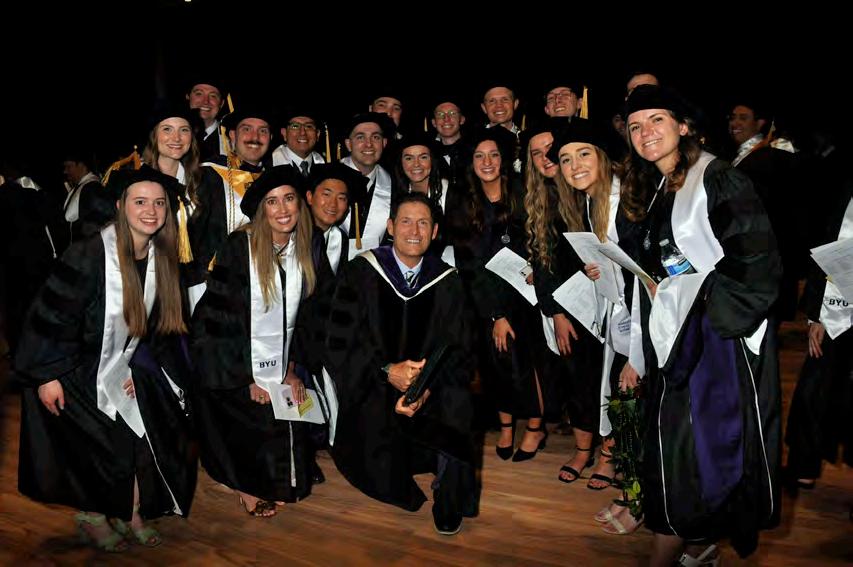
Associate professor Lucy Williams was destined to teach. She grew up in Park City, Utah, very close to her grandfather who was a professor. “People were always so excited to tell me about the impact he had had on them,” she remembers. This regular, positive association with teaching led her down her own path to becoming a professor.
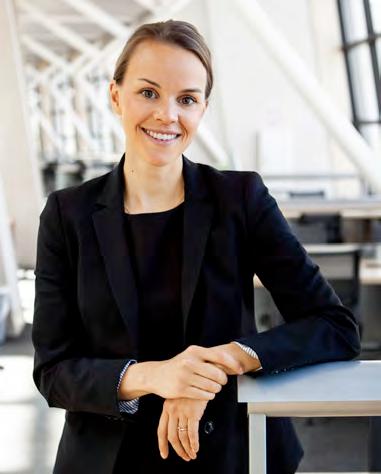
After graduating with her bachelor’s degree in political science from the University of Utah, Williams began a joint JD-PhD program at the University of California, Los Angeles, where she pursued research in political theory. She enjoyed the political science classes much more than the law classes, and so upon completing the program she came to BYU to teach in the Department of Political Science. Williams had concluded that political science, not law, was the field where she could best explore what she calls the “big, normative questions that interest me, [such as], ‘How do we structure society, and how should we structure society?’”
But after a year of teaching, Williams left BYU to clerk for Judge Scott Matheson Jr. on the US Court of Appeals for the Tenth
Circuit. “Judge Matheson is very academic,” Williams explains, “and very interested in more abstract discussions of what the law did and could do.” Clerking made Williams realize that, despite her initial assessment, she could best explore her interests by combining her expertise in political theory with her legal training. So she joined the BYU Law faculty in fall 2021. Williams’s current research focuses on the worldbuilding effects of language— especially legal language—in constructing the ideal state.
Even as she pursues fascinating research, Williams also excels in her teaching. Former student Erin Wong, ’23, says, “Professor Williams prioritized student learning from day one of class. She organized class content and class objectives clearly at the start of each class period and provided regular assessments with immediate opportunities for feedback.” Randi Kurth, 1L, also praises Williams’s teaching style: “Her class was the first time I understood the purpose of an outline.”
Professor Williams attributes her emphasis on the structure of how she teaches to her own experience as a 1L. “That first year I was learning the substance of the law, but I was also learning how to be a law student,” she says. “That’s an additional difficulty that I want to avoid imposing on my students as much as I can.”
For this reason, a key component of her teaching structure is giving formative assessments throughout the semester. These assessments, including a midterm, are graded on completion, and Professor Williams offers detailed feedback to every student on each assignment. Of course, this means a great deal more work for Williams, but she knows that her students appreciate it. One of these students, Trevor Oldham, 1L, observes, “I didn’t realize how much I hated the law school norm—of first applying the law you’ve learned at the end of the semester, on the final— until I had the chance to get
feedback on my midterm from Professor Williams.”
Additionally, Professor Williams feels obligated as an educator to ensure her students understand how to apply what she is teaching them. She says, “At the end of the day, I am teaching because I want people to learn well.” She also knows that her students are headed for careers that really impact others and that she might be their only formal instructor on a particular subject.
The time and effort Professor Williams devotes to her students and to her faculty service responsibilities on the curriculum and clerkship committees is remarkable given that she and her husband just welcomed their first child last summer. She often reminds herself when rocking her daughter to sleep, “This is the most important work I’ll ever do.” Even so, her students are grateful for the important work she has done for them all semester, and BYU Law is lucky to have another professor who is so devoted to her students’ success.
When associate dean Michalyn Steele served as a staff member on the Senate Judiciary Committee, she left a meeting one day knowing she would become a lawyer. Her mother had graduated from BYU Law School—the first Native American woman to do so—but Steele planned to take a different path. She had completed both her BA and MA in humanities at BYU and intended to pursue a PhD and a professorship in that field. But Steele’s detour into public policy changed her career plan when she realized that the people who were making the biggest impact were all attorneys.
After graduating from Georgetown University Law Center in 2001, Steele began her legal career with one of the leading firms specializing in the representation of Indian tribes: Sonosky, Chambers, Sachse, Endreson & Perry. Three years later she
moved to the US Department of Justice, where she worked as a trial attorney in the Housing and Civil Enforcement Section of the Civil Rights Division. Then, when President Barack Obama appointed Larry Echo Hawk, a former BYU Law professor, to be assistant secretary for Indian affairs in the US Department of the Interior, Steele joined Echo Hawk as a counselor. While working in the department, Steele met others from BYU Law, and she began to consider pivoting to a career in academia. Steele came to BYU Law School in 2011 as a distinguished practitioner in residence, advancing to full professorship in 2019. In 2022 she took on additional duties as associate dean for faculty and curriculum and was named the Marion G. Romney Professor of Law.
Dean Steele’s scholarship centers around Indian law, with a special emphasis on separation of powers and the federal-tribal relationship. In her research, Steele often collaborates with other legal
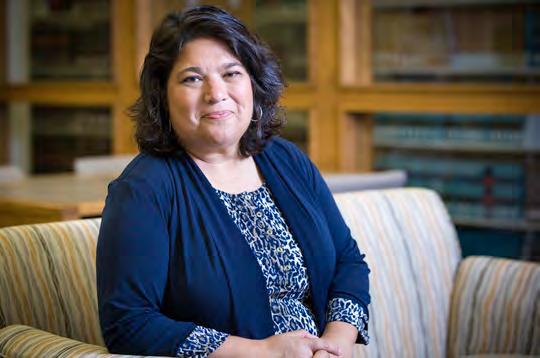
scholars, including her fellow BYU Law professors, combining strengths to publish nuanced and thoughtful legal articles. Some of her most recent publications concern environmental justice, tribal sovereignty and treatymaking, and legal protections for indigenous sacred sites.
Since joining the BYU Law faculty, Steele has taught Federal Indian Law, Structures of the Constitution, Civil Rights, Evidence, and more. Her experience in both private practice and in government, as well as her contributions to public policy work, give her a unique ability to connect with students with a range of backgrounds and career interests. Add to this her deep empathy and optimism, and it’s clear why she was named the 2L-3L Professor of the Year in 2020 and again in 2021. Steele’s classroom instruction focuses on essential legal topics and encourages students to approach the law with compassion and high ethical standards. Her teaching seeks to fulfill all four of BYU’s educational aims:
“(1) spiritually strengthening,
(2) intellectually enlarging, and (3) character building,
leading to (4) lifelong learning and service” (Aims of a BYU Education).
Dean Steele has had an indelible impact not only on the Law School but also on the broader BYU community. In 2020 she was appointed to the university’s Committee on Race, Equity, and Belonging. The committee, at the direction of BYU president Kevin Worthen, prepared a report on the state of racial equity on campus and submitted 26 recommendations for addressing issues of racism and prejudice at BYU. Steele’s work on the committee paved the way for a more welcoming and inclusive campus, and she continues to share her insights with the Law School community, especially in her classes.
BYU Law has been a productive and fulfilling part of Steele’s professional journey. Above all, she is amazed by the quality of students at the school, and she is inspired by the students’ desires to use their unique gifts to serve their communities. Steele finds it gratifying to see her students learn and grow in order to fulfill their potential and make the world a better place for all.
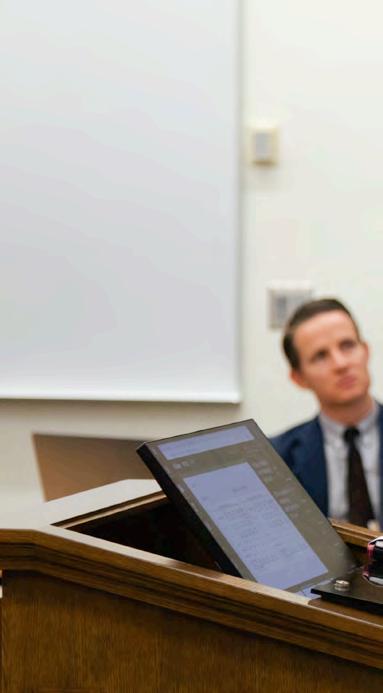 BY RACHEL EDWARDS
BY RACHEL EDWARDS
n March 31, 2023, BYU Law hosted its second annual Conference on Empirical Legal Studies. At the conference, law students who were enrolled in BYU Law’s year-long Empirical Legal Studies (ELS) course presented their findings from empirical research projects on a legal topic of their choice. Team-taught by Professors Dane Thorley and Cree Jones, the project-based course exposes students to the cutting-edge work of disciplinary legal empiricists. Thorley and Jones teach their students to answer important and timely legal questions using principles of statistical inquiry. The empirical approach to law—which includes conducting surveys, experiments, field research, and secondary data analysis—is trending, and Jones and Thorley’s unique curriculum is quickly gaining popularity among BYU Law students.
“We live in a world where lawyers and nonlawyers need to understand data and statistics,” says Thorley. “A BYU Law degree is a leadership degree and it’s especially critical that
leaders are statistically literate.” Legal scholars like Thorley and Jones are turning to ELS research methods in their scholarship to provide quantitative and qualitative data that can’t be produced through traditional legal research methods.
BYU Law’s ELS course aims to expose students to the tools and methodologies Thorley and Jones use in their own research. “Our goal is for students to gain a better understanding of the mechanics of empirical legal research and writing so that they become better consumers of these types of studies,” says Jones. “Law students are trained to think of every plausible argument on either side of an issue by posing hypothetical outcomes. Empirics makes it possible to answer questions about those hypothetical assumptions. Knowing the answer can actually change legal outcomes.”
During the first semester of the course, students are trained in basic statistics and statistical inference and are
exposed to empirical legal literature. In the second semester, students spend their time formulating a question in a substantive area of the law, finding and analyzing relevant data, and writing an empirical paper. The projects are time intensive; each student works with a faculty advisor who is an expert in the student’s chosen area and who can offer meaningful feedback. Students finish the class with a full-length, publishable academic paper.
Despite having similar backgrounds, Thorley and Jones bring distinctive skill sets to the classroom. Thorley is a 2017 graduate of Yale Law School and earned a PhD in political science from Columbia University in 2019. His scholarship focuses on criminal law and justice reform. Jones earned his law degree from the University of Michigan Law School in 2013 and completed a PhD in economics at the University of Chicago in 2018. He researches international economic law with an emphasis on trade and investment. “Within empirical legal studies, Professor Thorley and I have very different approaches,” says Jones. “Dane uses a lot of experiments and I use preexisting data to answer questions in a compelling way. For the purposes of our class, we have a broad range of substantive areas of the law that we are interested in as well as a broad range of methodologies, so we are well positioned to complement each other.”
The ELS course is in its second year and is already in high demand. “The big question in the beginning was whether or not we would have enough interest,” Thorley remembers.
“We understand that law students aren’t coming to law school to learn statistics; in fact, many found their way to law school because of a reluctance to do math or statistics in their undergraduate programs. We’ve had a great response. This year we had twice as many students on the waitlist as we could enroll.” Thorley and Jones are already looking for ways to increase course capacity to accommodate more students next year. “Whether our graduates end up in government settings or private firms, they need to be able to digest and appropriately critique empirical data so that they can be in the driver’s seat when it comes to making decisions as opposed to having to rely on someone else’s expertise,” Thorley says. Jones adds: “We hope that when
students leave our class, they will continue asking important questions about the legal system and that they will have a solid skill set to answer those questions. If students leave our class fully literate in empirical methods, specifically in a legal context, we have accomplished our goal.”
Brady Earley, a 2L at the University of Chicago Law School and visiting empirical research fellow at BYU Law, enjoys working closely with other students in the ELS course. Earley graduated from BYU in economics in 2021 and is planning to pursue a career in academia. He says the opportunity to assist Thorley and Jones with their research and to be involved as a teaching assistant
for the course has been a great experience. “Professor Jones and Professor Thorley have a real love for this subject and are great mentors,” he says. “It can be hard for law students to find their path, and many are leaving this class more focused and motivated thanks to the skills they now have.”
Earley’s role in the class has evolved. During the first semester, while the students were learning the nuts and bolts of empirical studies, he walked them through classroom assignments and graded their work. During the second semester, Earley focused on helping students find unique data for their individual projects. He explains, “Depending on their chosen subject, some students ran experiments and others used surveys or used data that had already been
collected. Some underestimated how long it can take to find and clean data [correcting errors and inconsistencies to make it easier to use]. Very rarely do you find a data set that has everything you are interested in looking at, and I enjoy helping the students find workarounds.”
Earley predicts that empirical work will become more common in courtrooms and legislatures. “The law is a medium for effecting change in society,” he says. “Many times, lawyers focus purely on the logical side of things without recognizing that there are empirical assumptions that underlie that logic. BYU Law’s ELS course helps students to become better advocates for change because they learn to draw on data and evidence to back up their arguments—and to do it in a confident way that is sometimes lacking in the legal profession. As I’ve gone through the class, I’ve realized how critical empirical skills are.”
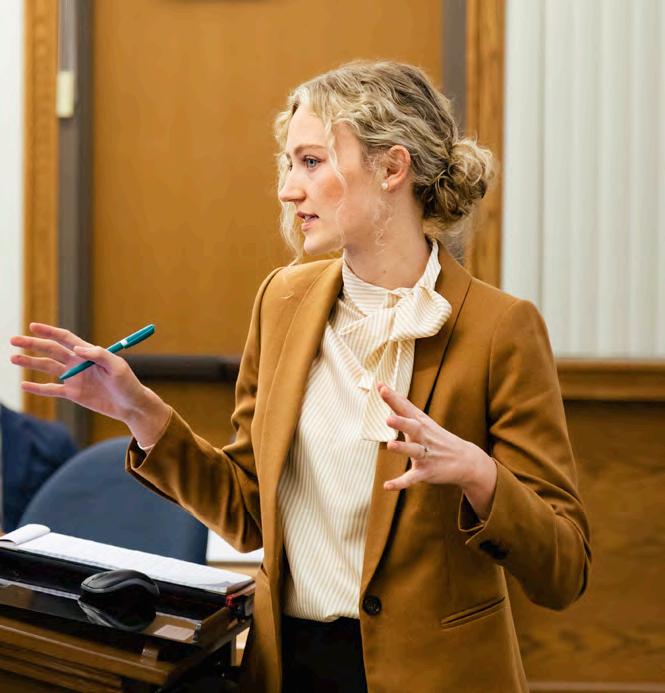
Emily Gottfredson, 2L, was excited to be one of 12 students selected for the 2023 ELS course. “I liked the idea of a data-driven substantial writing credit paper,” she says. “I spoke with students who had taken the class last year, and although they warned me that it required a lot of work, they thought it was worth it.”
Gottfredson studied finance as an undergraduate and worked as a partner in the Campus Founders Fund, a student-run venture capital fund that invests solely in student-run ventures. She chose to explore board diversity within public companies for
her empirical project. At the March 2023 conference, she presented “A Seat at the Table: An Empirical Look at California’s Board Diversity Law,” which explores whether California’s 2018 law mandating board diversity in public companies affected firms’ values. Gottfredson used a research method called the differences-in-differences regression model to compare a treatment group to a control group and assess any causal effect of the law. “Laws backed by great research and supported by thoughtful legislators pass all the time, but oftentimes we don’t know what the true effect of those laws is,” she explains. “That’s one thing that empirical legal studies aim to do: bring more data to the table by asking, ‘Were these laws effective? If they weren’t effective, how can we take a better approach?’”
Gottfredson, who will work with Wilson Sonsini Goodrich & Rosati’s corporate group in Palo Alto, California, this summer, is enthusiastic about her experience in the course. “I’ll be working at a large law firm, helping early-stage companies and investors navigate challenging problems. The ability to see a problem and bring data to the solution will be invaluable,” she says. According to Gottfredson, learning to engage with empirical scholars and to understand different types of research is like learning a new language: “I learned to question my assumptions and walked away with a whole new mindset and view of the world that I can’t unsee. The course requires a lot, but it was a highly rewarding experience.”
Established in 2022, BYU Law’s Global Business Law Program is focused on designing legal solutions for the most challenging problems in the modern economy. The program facilitates research, curriculum, conversations, and policy engagement on contemporary topics of interest to the international business community. Key topics have included corporate governance, securities regulation, antitrust law, mergers and acquisitions, sustainability, and diversity, equity, and inclusion.
BYU Law faculty involved in the program have a wide range of professional experience; some have served as general counsel to Fortune 500 companies, while others have practiced at leading Wall Street law firms. They also serve in organizations including the American Law Institute, the Financial Industry Regulatory Authority, and the American Bar Association’s Business Law Section and share research with regulators such as the Securities and Exchange Commission and with courts including the Delaware Court of Chancery.
The Global Business Law Program is an incubator for new studies and research methods and a platform for academic and private sector collaboration. It
offers an innovative curriculum for training the next generation of corporate lawyers, regulatory attorneys, and litigators. Courses include foundational classes covering the key pillars of business law as well as immersive simulation classes. The program additionally serves as an umbrella for several existing BYU Law offerings, including the annual Winter Deals Conference, the Deals Academy in New York City, the Startups Academy in Palo Alto, California, and Global Law Seminars in London, Geneva, and Dubai. BYU Law faculty are planning site visits in East Asia and India, among other locations around the globe, to identify locales for future programs. Each of these opportunities prepares students for dynamic careers and a lifetime of leadership.
One of the offerings under the Global Business Law Program umbrella, BYU Law’s annual Winter Deals Conference brings leading scholars, policymakers, and practitioners to Park City, Utah. In the heart of one of the most vibrant technology clusters in the United States, they discuss the modern global economy’s most pressing legal issues. The unprecedented scale, complexity, and dynamism of 21st century markets present a difficult challenge for legal institutions charged with providing
stable rules that businesses can trust as they make investments while rapidly adapting to new demands, disruptive technologies, and crises. The conference explores policies for addressing that tension in a variety of domains, from mergers and acquisitions to venture capital to corporate governance.
At the 5th Annual Winter Deals Conference, Lori W. Will, a vice chancellor of the Delaware Court of Chancery, discussed the recent increase in litigation involving special purpose acquisition companies (SPACs), which became a popular device on Wall Street in 2019. Vice Chancellor Will discussed the unique characteristics of SPACs and the novel fiduciary duty issues they raise, providing practical guidance and highlighting areas where academic research can be particularly useful.
The Global Law Seminars also provide students with invaluable learning opportunities.
BYU Law students can spend a semester in London, a crossroads for the global legal market with a rich history of legal innovation and development.
London sits at the intersection of US, UK, and European law, and students take courses in corporate and international law while working with practitioners in the financial sector.
Alternatively, a semester in Geneva, a world capital for international law, allows students to study international trade law and human rights jurisprudence while completing externships with organizations such as the United Nations Conference on Trade and Development, the Office of the UN High Commissioner for Human Rights, and the US Mission in Geneva.
A new offering in 2023 was a semester learning law in Dubai, a city at the center of countless global deals and a key English-speaking hub for the Middle East. Here in one of the world’s most important cities, students take international law and business courses while participating in externships with providers actively involved in international transactions and litigation.
The Global Business Law Program facilitates new events and research, curriculum expansion, and cross-border engagement to foster partnerships and best practices for policy in developing markets. The program’s first initiative, the Future of Antitrust series, provides a forum for collaboration and constructive debate for those advancing the next generation of antitrust policy around the world. Participants have included policymakers, practitioners, BYU Law faculty and fellows, and other scholars, representing a range of perspectives in contemporary antitrust law and policy.
One topic of particular interest is how recent advances in technology impact competition. In June 2022, the Future of Antitrust series kicked off with a webinar in
which distinguished panelists from both the academic and business realms explored the terms of the American Innovation and Choice Online Act (S.2992), which would significantly change US antitrust and competition law and policy. The bill would prohibit the largest tech platforms from self-preferencing their own products and services to the detriment of competitors and would ban other behaviors that the bill’s advocates argue harm competition. A second webinar explored the increase in the Federal Trade Commission’s (FTC) activity as a rule maker, a role it has historically avoided.
The first conference of the series, “Tech Platforms and Online Retail in a New Age of Competition Law,” was held a few months later, in October 2022, in Washington, DC. This conference brought together academics, policymakers, and practitioners to discuss the many efforts underway, both domestically and internationally, to regulate large technology platforms. In February 2023, a second conference in Washington, DC, titled “The Past, Present, and Future of FTC Rulemaking,” built on the successful FTC-focused webinar and included keynotes from Christine Wilson, commissioner of the FTC and director of FTC’s Office of Policy Planning, on what lies ahead for the FTC and competition policy.
The recent April 2023 conference, “Innovation, Networks, and the Frontiers of Competitional Law,” in Brussels focused on how the regulatory state—and competition policy specifically—should evolve to meet the emergence of the 21st-century networked
Academies (7)
Law Seminars (3)
Study Tours (3) Jerusalem Initiative
economy. Discrete areas of interest included the global market for mergers and acquisitions, the regulation of Big Tech, and the private equity industry. Seasoned experts and new voices alike contributed to important discussions about antitrust law’s place in the next chapter of contemporary capitalism.
The series received an unrestricted $500,000 grant from Amazon to provide funding for conferences and webinars, research fellows and assistants, and proprietary data used for empirical research.
“Antitrust law is front page news,” says BYU Law professor Matthew Jennejohn, “and a technocratic policy tradition is now challenged by new—and often political—alternatives.”
In addition to the Future of Antitrust series, the Global Business Law Program is educating students on antitrust through Jennejohn’s new one-credit intensive course on antitrust law and policy called Real World Antitrust.
In the course, Jennejohn explores antitrust law through a practitioner’s lens, combining antitrust fundamentals with real-world examples illustrating the breadth of a global antitrust team’s practice at an international law firm. Partners from the DC, New York, and London offices of Shearman & Sterling who have played significant roles at the FTC, the US Department of Justice Antitrust Division, and the European Commission simulate working on a major antitrust matter. This popular course appeals not only to students interested in antitrust
but also to those planning to pursue a transactional or regulatory practice.
Reinforcing BYU’s Mission BYU Law dean D. Gordon Smith is confident that the Global Business Law Program will continue to identify issues of importance, attract partners, and influence policy. The program also furthers BYU Law’s increasingly global reach. Dean Smith notes that global work is in the DNA of BYU Law students, many of whom have lived outside the US, speak a second language, and can easily connect their language skills to their legal expertise. BYU’s vast global network of alumni, supporters, and faculty uniquely positions BYU Law to effect positive change on the international stage, fulfilling BYU’s objective to be a light “for the benefit of the world.”
Clark D. Asay
An Empirical Study of Copyright’s Substantial Similarity Test, 13 UC IrvIne L. rev 35 (2022). Also selected for presentation at the Seventh Annual Copyright Scholarship Roundtable at Columbia Law School.
---------------
Software’s Legal Future, in 7 FrontIers In res. MetrICs & AnALytICs 980744 (2022).
---------------
An Empirical Study of the DMCA’s Anti-Circumvention Provisions, FLA. st. U. L. rev. (forthcoming 2023).
William W. Clayton High-End Securities Regulation, 13 HArv BUs. L. rev. (forthcoming 2023).

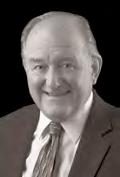

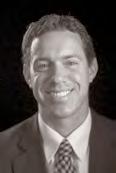
---------------
How Public Pension Plans Have Shaped Private Equity, 81 Md L. Rev. 840 (2022).
Elysa M. Dishman Generals of the Resistance: Multistate Actions and Nationwide Injunctions, 54 ArIz st. L.J. 359 (2022).
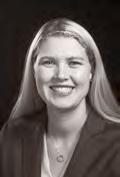
---------------
Monitoring Corporate Compliance Through Cooperative Federalism: Trends in Multistate Settlements by State Attorneys General, 52 PUBLIUs 497 (2022) (with Colin Provost and Paul Nolette).
---------------
West Virginia v. EPA: Major Questions for the Future of the Administrative State and American Federalism, 53 PUBLIUs 435 (2023).
J. Clifton Fleming Jr. International Aspects of US Corporate Taxation, in reseArCH
HAndBook on CorPorAte tAxAtIon 112 (Reuven S. Avi-Yonah ed., Edward Elgar 2023).
--------------
Viewing the GILTI Tax Rates Through a Tax Expenditure Lens, 177 tAx notes Fed 1525.
Frederick Mark Gedicks Coase and Accommodation: A Reply, 71 eMory L.J. 1457 (2022).

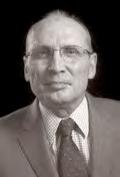
---------------
Custom, Preference, or Nature?: Mormon Polygamy, Same-Sex Marriage, and Natural Law Theory, in QUeer And reLIgIoUs ALLIAnCes In FAMILy LAw PoLItICs And Beyond 31 (Nausica Palazzo and Jeffrey A. Redding eds., Anthem Press 2022).
Matthew Jennejohn
Gender and the Social Structure of Exclusion in US Corporate Law, U. CHI. L. rev. (forthcoming 2023) (with Afra Afsharipour). ---------------
Top-Ups and “Telephone,” J. LegAL stUd (forthcoming 2023) (with Kristina Bishop and Cree Jones).
Eric Talbot Jensen International Law: Corpus Linguistics and Ordinary Meaning, 54 geo. wAsH. Int’L L. rev. 1 (2022) (with James Rex Lee). ---------------
LOAC and the Protection and Use of Digital Property in Armed Conflict, in tHe rIgHts to PrIvACy And dAtA ProteCtIon In ArMed ConFLICt 50 (Russell Buchan and Asaf Lubin eds., CCDCOE 2022) (with Laurie R. Blank).
Cree Jones
Top-Ups and “Telephone,” J. LegAL stUd (forthcoming 2023) (with Kristina Bishop and Matthew Jennejohn).
---------------
(Un)Stable BITs, 47 yALe J. Int’L L . 247 (2022) (with Weijia Rao).
Kristin Gerdy Kyle Solving the Parental Catch22: Special Masters During Times of Crisis, 60 FAM. Ct rev. 259 (2022) (with Benjamin Forsgren).
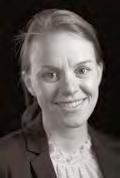
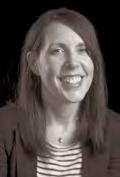
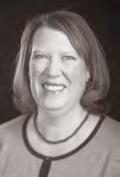
Tom Lee
The Pragmatics of Institutional Discourse, in tHe enCyCLoPedIA oF APPLIed LIngUIstICs (forthcoming 2023) (with Jesse Egbert and Margaret Wood).
David H. Moore
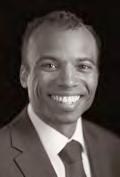
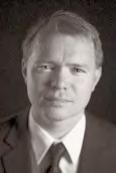
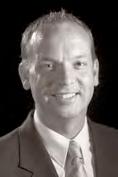
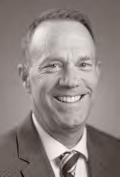
Treaty Interpretation at the Human Rights Committee:
Reconciling International Law and Normativity, 56 U.C. dAvIs L. rev. 1311 (2023).
Aaron L. Nielson Congress’s Anti-Removal Power, 76 vAnd. L. rev. 1 (2023) (with Christopher J. Walker).

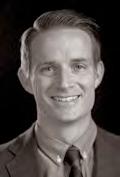
---------------
Qualified Immunity’s 51 Imperfect Solutions, 17 dUke
J. Const. L. & PUB. PoL’y 321 (2023) (with Christopher J. Walker).
---------------
Civil Rights Litigation in the Lower Courts: The Justice Barrett Edition, 112 J. CrIM. L. & CrIMInoLogy 145 (2022) (with Paul Stancil).
---------------
The Early Years of Congress’s Anti-Removal Power, AM. J. LegAL HIst. (forthcoming 2023) (with Christopher J. Walker).
---------------
What Happens If the FTC Becomes a Serious Rulemaker?, in FtC’s rULeMAkIng AUtHorIty
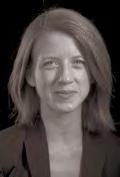
oF tHe Us FederAL trAde CoMMIssIon (Daniel A. Crane ed., 2022).
---------------
Article II and the Federal Reserve, CorneLL L. rev (forthcoming 2024) (with Aditya Bamzai).
Stephanie Plamondon
Smart Patents, 2023 U. ILL
L. rev. 419 (2023).
---------------
Macro- and Micro-Level Accounts of Behavior in Innovation Law: The Role of Social Norms and Psychological Motivations, in InteLLeCtUAL ProPerty LAw In Context: LAw And soCIety PersPeCtIves on IP (William T. Gallagher and Debora J. Halbert eds., Cambridge University Press 2023 [forthcoming]) (with Laura Pedraza-Fariña).
---------------
The Sociology and Psychology of Innovation: A Synthesis and Research Agenda for Intellectual Property Scholars, 60 HoUs. L. rev 261 (2022) (with Laura Pedraza-Fariña).
---------------
Inequality in Abundance, 7 FrontIers In res. MetrICs & AnALytICs 980677 (2022).
Bradley Rebeiro
The Work Is Not Done: Frederick Douglass and Black Suffrage, 97 notre dAMe L. rev 1511 (2022).
Gladriel Shobe
Innovations in IPO Deal
Structure: Do Up-C IPOs Harm Public Shareholders?, 69 MgMt sCI 3048 (2022) (with Mary Brooke Billings, Kevin Hsueh, and Melissa F. Lewis-Western).
Dane Thorley
The Failure of Judicial Recusal and Disclosure Rules: Evidence from a Field Experiment, 117 nw. U. L. rev 1277 (2023).
Lucy Williams
Book Review, 10 AM. PoL tHoUgHt 656 (2021) (reviewing Jordan Carson, AMerICAn exCePtIonALIsM As reLIgIon: PostModern dIsContent (2020)).
and recognizes religious freedom as a fundamental right. It further prohibits discrimination based on religion and has been instrumental in promoting tolerance and respect for religious diversity in Brazilian society.
Fábio Ferreira Nascimento is a Brazilian lawyer and a member of the J. Reuben Clark Law Society International Service & Outreach Committee and the Brazilian Federal Bar Association Religious Freedom Commission. He is a former member of the National Committee on Respect for Religious Diversity in the Secretariat for Human Rights of the Presidency of the Republic of Brazil.
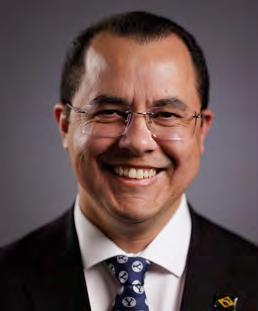
Brazil has a rich history of religious diversity. According to the Brazilian Institute of Geography and Statistics, over 80 percent of the Brazilian population identify as Christian, but there are also significant populations of Spiritualists, Muslims, Buddhists, Jews, and other religious groups. Brazil’s constitution, enacted in 1988, guarantees the right to practice any religion
This religious freedom has promoted social cohesion in Brazil, a country that has a long history of racial and ethnic diversity. Religious tolerance has allowed people of different ethnicities to coexist peacefully and enjoy a sense of national unity. It also promotes the preservation of Brazil’s unique cultural mix, celebrated through music, art, and literature. For example, the AfroBrazilian religion of Candomblé has had a significant impact on Brazilian music and dance, while the Jewish community has made significant contributions to Brazilian literature.
Religious freedom has additionally contributed to the development of Brazilian civil society. Religious groups have played an essential role in addressing social and economic issues by providing valuable services in social welfare, education, healthcare, and other areas.
However, challenges to religious freedom persist in Brazil today. Discrimination against religious minorities is a significant issue, and there have
been instances of violence and persecution against religious groups. Some religious groups have been accused of exploiting vulnerable populations, such as the poor.
To confront these challenges, it is essential to continue promoting tolerance and respect for diversity in Brazilian society. This can be achieved through educational initiatives that raise awareness, promote religious literacy, foster understanding between different religious groups, and support laws and policies that protect the rights of religious minorities.
The Essential Role of ICLRS
This is where BYU Law’s International Center for Law and Religion Studies (ICLRS) is making a difference. ICLRS is one of the most widely recognized organizations promoting religious liberty in the world.
Every October for the past 29 years, ICLRS has hosted an Annual International Law and Religion Symposium in Provo, Utah, and invited delegates from around the world. More than a hundred Brazilian scholars, civic administrators, and religious leaders have attended over the years, and these symposium alumni have become ardent defenders of religious freedom in Brazil.
In 2022, ICLRS partnered with the Federal University of Uberlândia to hold its first
Brazilian Symposium on Religious Freedom, in Rio de Janeiro. The event was so successful that a second symposium will be held in August 2023, this time in Brasília. A third annual event has been planned for 2024, when ICLRS will partner with other groups to sponsor the G20 Interfaith Forum in advance of the G20 Summit to be held in Brazil.
Many academic institutions, nongovernmental organizations, interfaith alliances, and religious groups partner with ICLRS in Brazil. Among other efforts, ICLRS and its partners publish brochures that explain the importance of religious freedom for citizens of many countries in the world.
I decided to obtain an LLM at BYU Law this past year in order to become more involved with ICLRS and contribute to its critical work in preserving religious freedom in my country. During my studies, I actively participated in ICLRS events and initiatives, and I feel strengthened with knowledge and experience to better serve the cause of religious freedom when I return to Brazil. To that end, I will be working with two fellow Brazilian LLM graduates, Yatyr Moreira Cesar Neto, ’23, and Lucas Guerreiro, ’23, to create a nonprofit organization to advocate for religious freedom in our country. I thank BYU Law for that.
There is a saying in law school: “In 1L they scare you to death, in 2L they work you to death, and in 3L . .”—well, 3L is a blank slate for many law students.
3L is a year for students to clean up, get the credits they need to graduate, try out a clinic, or maybe even travel. At some point during their last year in law school, 3Ls begin to detach and start focusing on the future. I am no exception, yet by making it a point to keep learning and developing new legal skills, I have made my last year of law school my best.
I moved from Madrid to Provo for law school, which was quite a culture shock. In addition, the 1L learning curve was daunting. My cocurriculars— moot court and a law journal—steered me toward litigation. I competed in moot court and advocacy competitions and externed for
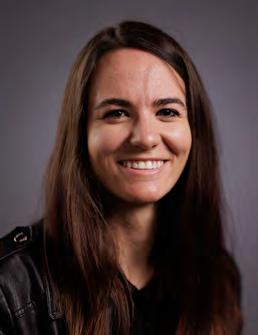
three judges: Justice Pearce of the Utah Supreme Court, Judge Stewart of the US District Court for the District of Utah, and Judge Forrest of the US Court of Appeals for the Ninth Circuit. Then, in my negotiation and international arbitration courses, I learned how legal conflict can be solved through alternative dispute resolution. I was able to participate in BYU Law’s International Commercial Arbitration Academy in Singapore, where I took part in an arbitration at Baker McKenzie. That was a magical experience, and I thought my love affair with alternative dispute resolution would continue. But when I became a 3L and signed up for writingheavy courses and an appellate clinic for fall semester, I did not have time to take any alternative dispute resolution courses. I approached my last semester of law school ready to take on this heavy course load.
But my last semester started out as a disaster. Because of personal issues, I was forced to drastically simplify my life. I dropped all my classes and the appellate clinic. (I still mourn them!) My new challenge was to fill out a nine-credit schedule with minimal reading,
papers, and finals. Fortunately, I had unknowingly laid the foundation for making the most of my “disaster” semester. I found a way to build on the dispute-resolution experience I had enjoyed in the Singapore Academy by participating in the BYU Center for Peace and Conflict Resolution (CPCR).
My involvement with CPCR was one of the most meaningful experiences I had in law school. The center facilitates mediations and arbitrations for BYU students and the community beyond campus. While externing at the CPCR, I served as an arbitrator, co-mediated multiple mediations, and observed many more—most of them landlord-tenant and contractor-homeowner conflicts. I interacted with real clients and developed soft skills I didn’t have before.
For example, while mediating, I suddenly had to juggle many things at once: the parties’ personalities and tensions, possible legal and financial ramifications, and my own understanding of each case. I learned that little things I might have considered inconsequential could make a huge difference, including where I sat at the table to mediate a dispute or whether there was food available to maintain energy for
difficult negotiations. Even the temperature of the room was important! I also learned how to keep an emotionally volatile atmosphere safe and how to facilitate settlement-oriented conversations. Sometimes I felt like a therapist, sometimes I felt like a parent, but I never felt like a judge, jury, or executioner.
This experience with the CPCR was priceless. I came to understand how a seemingly small conflict can escalate when two adverse parties are facing each other in a small room. I now understand what to look for in the things parties say (and don’t say). Managing conflicts while asserting enough authority to guide a settlement is both delicate and complicated.
These are not skills learned in a law school classroom. I am grateful I have been able to start developing these soft skills through my involvement in unconventional learning centers such as the Singapore Academy and CPCR. To current and future law students: Make your 3L year count— including your last semester. Try something new! Dip your toes into the real world with an externship or a clinic! Put to good use, your 3L year can be your best.
--------------
Generative artificial intelligence (AI) has been all the rage since the debut of ChatGPT in November 2022. Generative AI has been around for some time, but recent iterations like ChatGPT are easier to use and produce results that are more “human” than ever before. ChatGPT is built on a specialized form of machine learning called a large language model that analyzes huge quantities of data to build a model of relationships or parameters within that data. More data means a bet-
--------------
“You never get a second chance to make a first impression,” the saying goes. As a new litigation associate, I once dictated a stream-ofconsciousness legal analysis in a case that settled before I had refined or edited the draft. I sent the unfinished and unedited draft memo to my supervising partner to decide whether he should bill my time for preparing it. He assumed the memo represented my best work—why else would I let him see it? It took much time and effort to correct the
ter model and ChatGPT was trained on 45 terabytes of data. Generative AI applications can create everything from video game worlds to computer code to research data.
What makes ChatGPT superior to previous chatbots is its use of a transformer (the “T” in “ChatGPT”). Earlier chatbots relied on a long shortterm memory (LSTM) model to generate text by predicting the next most statistically probable word in a sequence of words based on the surrounding words. LSTM models can consider only a few surrounding words for context because they operate sequentially, limiting their ability to “understand” complex text. In contrast, transformer models, a type of neural network developed a few years ago by the research
team at Google Brain, are not limited to sequential analysis. Transformers can process input data simultaneously and weigh the value of individual words differently depending on the context, giving them a greater ability to decode complex relationships. ChatGPT’s technology is so good it can accurately summarize Supreme Court opinions and scholarly articles.
Generative AI is most successful when developers and
domain experts fine-tune it to focus on a narrow subject. Early efforts to incorporate generative AI technology into legal research platforms are creating both astonishingly useful results and disappointing failures. A major pitfall, especially for less-experienced practitioners, is that AI-produced research can appear convincingly correct even when it is inaccurate. As generative AI improves its accuracy and “shows its work” by providing citations to valid statutes and opinions, the technology will become a trusted tool for attorneys. Generative AI shows promise in its ability to speed up fundamental legal research tasks, but even with accurate AI, attorneys must maintain their ability to think creatively outside the AI box.
rarely turn around a court that is unconvinced by your briefs and is already skeptical of your position.
misimpression created by that one poorly written memo.
Based on three subsequent decades of my experience as a civil appellate specialist, here are my top tips to improve your legal writing:
1. Make a good first impression with an effective introduction. Your brief’s introduction is the one place you’ll have the court’s undivided attention. It conveys a tacit message about your professional competence and the brief’s reliability. Provide an overarching theme and succinctly preview each of your major legal arguments, giving
only enough factual detail to provide context for the issues. Imagine what a busy judge picking up the brief for the first time would want to know in order to understand the arguments that will follow.
2. Don’t count on oral argument to compensate for a poorly written brief. By the time you deliver oral argument, the court has already formed an opinion about your lawyering skills based on your briefing. The court will likely also have already prepared a tentative opinion, bench memorandum, or staff analysis. Brilliant oral advocacy can
3. Pay careful attention to tone. Don’t spend valuable space attacking opposing counsel or their motives. Avoid trite intensifiers like “very” and “obviously,” which signal a lack of confidence in the force of your arguments. Use a shownot-tell approach, convincing through logic rather than expression of outrage.
4. Protect your credibility and long-term reputation. Be scrupulously fair in citing the record and pertinent legal authorities. It takes only one inaccuracy to undermine the credibility of an entire brief. Remember that both the court and opposing counsel have long memories, and preserving your reputation is more important than achieving any single victory.
--------------
Baughman is a nationally recognized expert on criminal law and bail reform. Her current scholarship examines criminal justice policy and how religious institutions impact criminal justice reform and rehabilitation.
 The Honorable Thomas R. Lee
Rex J. and Maureen E. Rawlinson Professor of Law
The Honorable Thomas R. Lee
Rex J. and Maureen E. Rawlinson Professor of Law
-------------Lee served as associate chief justice on the Utah Supreme Court for 12 years. He is an innovator in law and corpus linguistics and his judicial opinions and scholarship advocate the use of linguists’ theories and tools to interpret the language of the law.
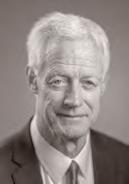
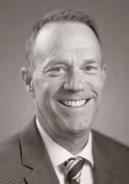
We’re standing, sitting, and studying where you did a few years (or maybe a few decades) ago. We need experienced mentors, generous donors, and exemplary alumni.
You can help BYU Law’s current students by
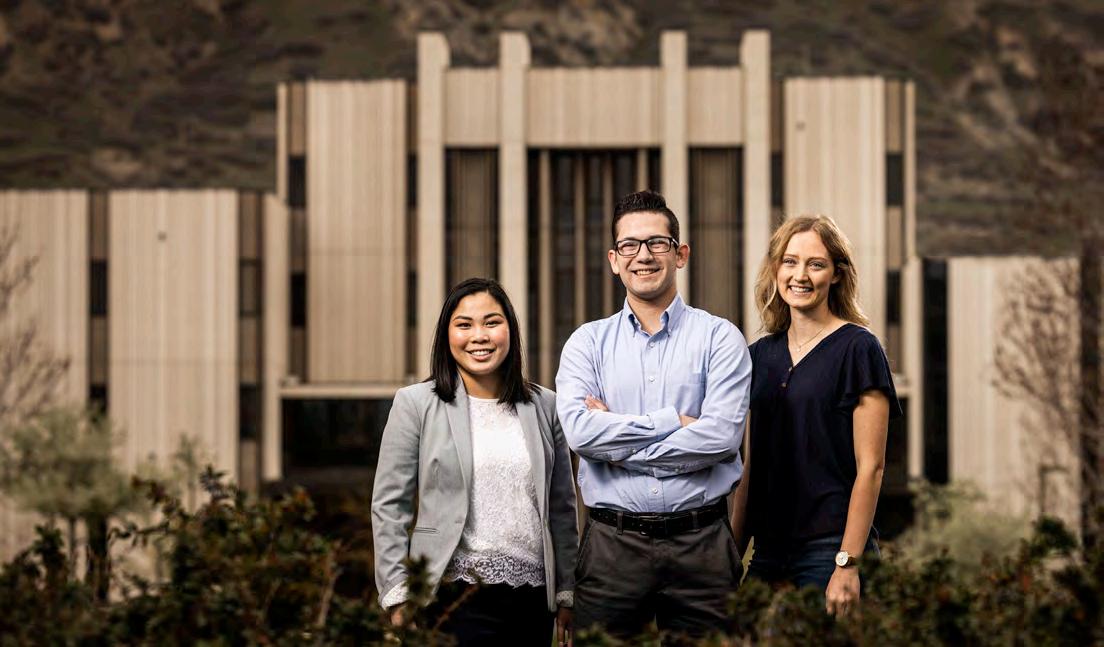
> volunteering as an Alumni Ally
> donating to scholarships
> providing jobs and internships
Kevin J Worthen Hugh W. Colton Professor of Law--------------
Following his nine-year tenure as president of Brigham Young University, Worthen will return to BYU Law full-time after a year at Yale Law School as a visiting professor. He is a noted scholar on federal Indian law and the impact of law on indigenous peoples internationally.
> recruiting new students CONNECT. SERVE. GIVE.
To volunteer, donate, or explore other ways to engage with the Law School, please call 801-422-7831 or visit law.byu.edu/give.
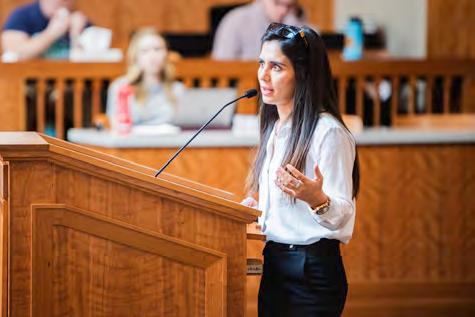
The Freedom of Religion or Belief Club (FoRB) was founded in 2021 to educate students about the international and domestic religious freedom landscape and connect them to experiences that advance religious freedom. In September the club hosted Daniel Benson, legal counsel at Becket Law, to discuss the religious liberty implications of several recent US Supreme Court decisions. In November FoRB partnered with the International Law Students Association to host Professor Dmytro Vovk—a visiting professor of law at Cardozo School of Law, an expert in human rights law, and a refugee from Kharkiv, Ukraine—to discuss how the Russia-Ukraine War has affected religious freedom. And this spring, Afghan human rights activist Crystal Bayat shared her powerful story of standing up to the Taliban in the name of fundamental freedoms.
Club members have also pursued a variety of FoRBrelated experiences, including internships with Becket Law, involvement with the International Religious Freedom Roundtable, and volunteer work with the International Religious Freedom Summit in Washington, DC.
BYU Law’s Black Law Students Association (BLSA) worked with the American Constitution Society to welcome Dr. Marcus Anthony Hunter, Scott Waugh Endowed Chair in the Division of Social Sciences and professor of sociology and African American studies at UCLA. Dr. Hunter shared observations from the book he recently coauthored, Chocolate Cities: The Black Map of American Life, in which he explores unique components of US cities where Black individuals have historically gathered, including “the village” (intricate networks formed for survival), “the soul” (distinct cultural features), and “the power” (economic and political power). In his address to students, Dr. Hunter raised questions about how these “chocolate city” hallmarks will survive the dilution of Black racial representation in these cities.
BLSA also worked with Barbara Melendez, BYU Law’s director of Diversity, Equity, and Belonging, to invite Dr. Anthony Bates, managing director of the BYU Sorensen Center for Moral and Ethical Leadership, to present his remarks, “Hear . . . and See Ye Indeed (Isaiah 6:9): Discourse Around Perspectives, Realities, and Race.”
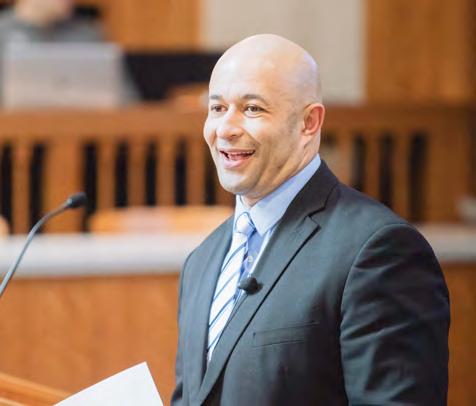
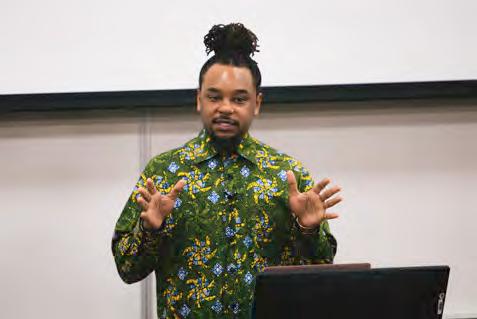
This year the BYU Law Student Well-Being Club (LSWC) implemented the Mental Health and Wellness Allies program, which allows a willing law student to become a “mental health and wellness ally.” Allies place a placard on their carrel to signify their willingness to serve as a listening ear for students in need. Over 50 law students have become allies, which has generated greater camaraderie regarding mental health and wellness throughout the Law School.
Additionally, LSWC members wrote notes of encouragement and provided pre-finals treats for all law students, hosted a week of service, designed a well-being art display in the Law School, and created a welcome video for the incoming class of 2026. The club’s popular baby animals de-stress event allowed law students to play with rabbits, piglets, and hedgehogs during the week preceding final exams. All of these efforts have heightened awareness of mental health issues and increased the resources available to address these concerns. The work of LSWC has made BYU Law an even better environment for students to learn and thrive.

The BYU student chapter of the Federalist Society is committed to the principle that higher education should be a place of open debate on important legal issues. Indeed, most of the chapter’s events this year included multiple speakers to provide diverse perspectives on the issues presented.

Two of this year’s events featured speakers who exemplify the Federalist Society’s commitment to free speech. In November the society welcomed Ilya Shapiro, senior fellow and director of constitutional studies at the Manhattan Institute, who shared his experience with cancel culture. He emphasized that disagreeable opinions, while perhaps subjectively offensive, do not merit exceptions to free speech policies on campus. Later that month the society welcomed Judge Ryan D. Nelson of the US Court of Appeals for the Ninth Circuit, who shared details about his role as author of the influential dissent in Kennedy v. Bremerton School District. The case was eventually reviewed by the Supreme Court, resulting in a significant change to First Amendment establishment clause jurisprudence.
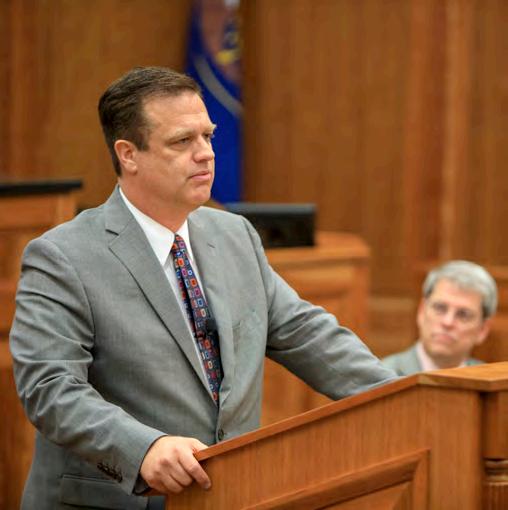
BYU Law’s first law forum of the year featured John R. Lund, chair of the Office of Legal Services Innovation, a joint task force of the Utah Supreme Court and the Utah Bar that is recommending significant changes to the regulation of legal services in order to improve access to justice in Utah. Attendees learned about Utah’s groundbreaking Regulatory Sandbox Program, which allows lawyers and other professionals to deliver nontraditional legal services under the supervision of the Utah Supreme Court. Since the program’s launch in 2020, Sandbox businesses have been providing legal services to Utahns for whom legal assistance would otherwise be out of reach. The Sandbox tests and analyzes innovative business models to ensure consumer protection and to gauge efficacy and value.
Despite trepidation from some in the legal community concerning the prospect of nonlawyers providing legal services, with harm to consumers cited as one of the biggest risks, Sandbox data suggests that fears about consumer harm are unfounded—and that, in fact, the opposite is true. Lund praised the Sandbox’s
successes in mitigating what he labeled a “crisis of democracy” for the vast majority of Utahns who cannot afford legal assistance with problems such as evictions, custody, divorce, domestic violence, and debt. Utah’s trailblazing efforts are a model for addressing the dire access-to-justice crisis in the United States.
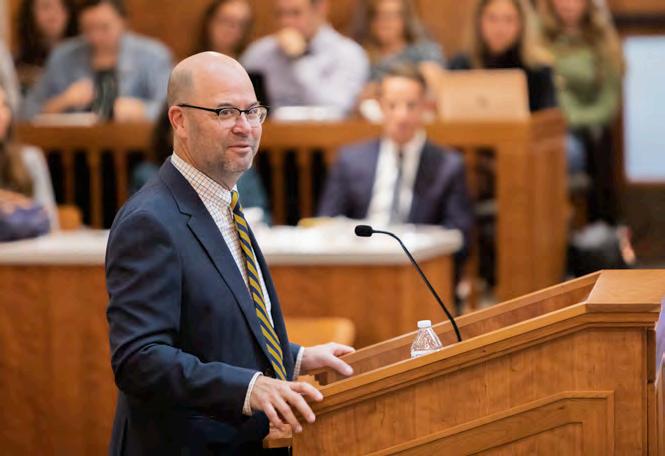
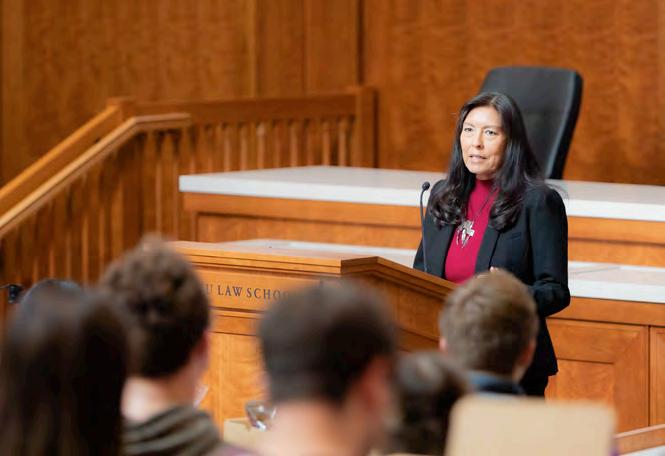
A leading authority on the role of religious freedom and churchstate relations, Professor Richard W. Garnett of Notre Dame Law School presented themes from the 1972 case Wisconsin v. Yoder, in which the US Supreme Court found that forcing Amish children to attend public high school violated their parents’ free exercise of religion. He explored how several of the arguments articulated in both the majority and dissenting opinions in this 50-year-old case still resonate today as the Court continues to grapple with balancing state interests and constitutional religious freedoms. Many questions Yoder raised remain a source of debate today, including questions of how to define religion, what constitutes government neutrality toward religion, and what level of burden on the practice of religion is required for exemption from a law. Many continue to wonder, “Does burdening a
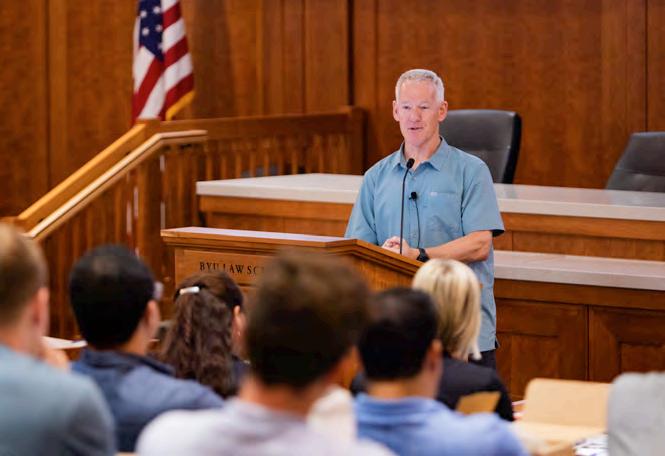
community’s exercise of their religion carry more weight than burdening an individual’s religious rights?” “Do parental rights have equal gravitas when it comes to educational exemptions for their children?” “What of children’s rights, which were not at issue in Yoder?” Professor Garnett foresees the Court revisiting many of these issues in the future. “Stay tuned,” he says.
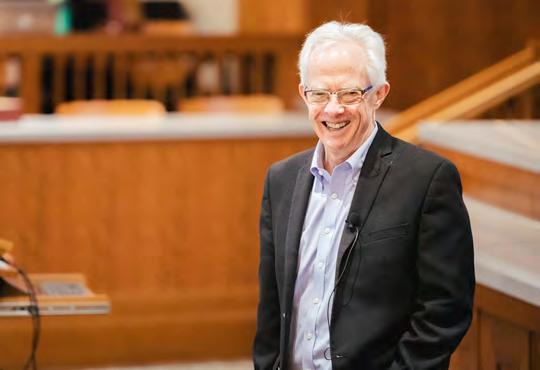
BYU Law’s Native American Law Students Association welcomed the Honorable Diane J. Humetewa, US district judge for the District of Arizona, citizen of the Hopi Tribe, and the first female Native American to serve as a federal judge. Judge
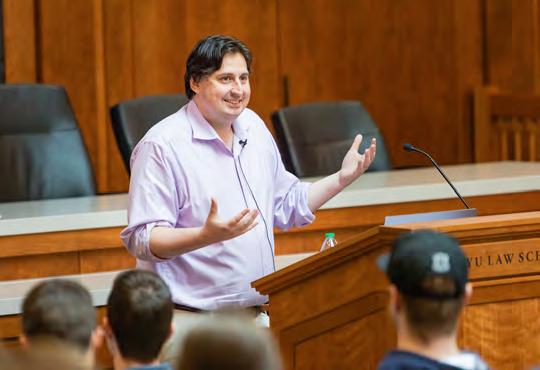
Humetewa shared details of her journey from her childhood village on the Hopi Reservation, which she noted is “one of the oldest continually inhabited places in the United States,” to her current role on the federal bench. She credits her father for insisting that she be proficient in English and credits her mother for requiring that she remain connected with her Hopi culture and heritage. As a result, she successfully straddled two worlds, gaining perspective from both her urban and Hopi environments.
Judge Humetewa’s path to becoming a lawyer—and now a federal judge—was forged as she was receptive to encouragement from superiors, which helped her gain the confidence to pursue opportunities that
came her way. These experiences inform her advice to prospective lawyers: “Don’t be afraid to walk through doors that open for you. And don’t hesitate to approach someone who has a skill you want to learn and ask them, for example, ‘How did you develop your advocacy skills?’ or ‘How are you so at home in a courtroom?’” In learning from mentors, lawyers can advance their education well beyond law school, she says.
Robert Ambrogi is an award-winning legal blogger (LawSites) and podcaster (LawNext). At one of this year’s Future of Law forums, Ambrogi shared his observations that the legal industry is undergoing more technologydriven change than ever before. He insisted that lawyers must actively maintain their tech competency if they wish to serve their clients effectively and run their businesses successfully.
Ambrogi pointed to three factors that have required lawyers to step up their tech competency in the past few years—factors that have demanded continued vigilance to navigate the ever-evolving legal tech landscape: the COVID-19 pandemic, artificial intelligence (AI) research, and legal regulatory reform. The pandemic transformed technology into a lifeline; even those who swore they would go to their graves using paper and dictation embraced technology that allowed them to work. An acceleration in AI-based research is upending how basic legal work gets done and requiring new lawyering skills,
including discerning between real and fabricated query results. Finally, legal regulatory reform is transforming how legal services are delivered; for example, Utah’s Regulatory Sandbox Program has generated many technology-driven legal solutions. Lawyers must continually invest in their own technology skills to manage client tech requirements and maintain client confidentiality. Ambrogi concludes, “Your duty of tech competence is really a duty you owe yourself to achieve success in your own life and career.”
Another of BYU Law’s Future of Law forums featured Pablo Arredondo, cofounder and chief innovation officer of Casetext, a technology platform that applies AI to legal research. Arredondo, a Stanford Law graduate, grew frustrated with the “keyword prison” of Lexis and Westlaw and was determined to better harness the flexibility and power of modern computing to improve legal research.
Casetext marries supercomputing technology with legal research. Users search with complete sentences, prompting “neural nets” to generate precise results by combing the entire common law with AI algorithms. After working with a collection of on-point authorities curated in mere seconds, litigators are left to wonder how the technology is possible. Alas, knowing how is impossible. Arredondo calls the tech a “black box”—there is no way to really know how AI produces the search results. Still, the availability of this advanced technology in the legal profession is very welcome.
Reviewed by Craig D. Galli, Distinguished Practitioner in Residence, with excerpts from On Tyranny
Joseph Smith admonished, “Thy mind, O Man, if thou wilt lead a soul into Salvation, must stretch as high as the utmost Heavens, and search into and contemplate the darkest abyss” (“History, 1838–1856, volume C-1 [2 November 1838–31 July 1842],” The Joseph Smith Papers, p. 904[b]). With the dark abyss of the January 6, 2021, attack on the United States Capitol and subsequent efforts to overthrow an election now in our rearview mirror, Yale history professor Timothy D. Snyder’s short but thoughtful 2017 book invites reflection on our current political woes in light of modern European history and events leading up to World War I and World War II.
The collection of short essays contained in On Tyranny: Twenty Lessons from the Twentieth Century serves to remind readers that “European history of the twentieth
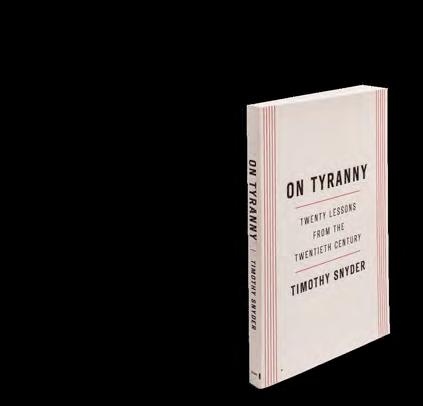
century shows us that societies can break, democracies can fall, ethics can collapse, and ordinary men can find themselves standing over death pits with guns in their hands.” The book’s essays warn the reader not to be “tempted to think that our democratic heritage automatically protects us from such threats. This is a misguided reflex. Our own tradition demands that we examine history to understand the deep sources of tyranny, and to consider the proper responses to it.”
Snyder offers four distinct history lessons that should inform citizens’ actions today.
First, actively defend the essential roles of courts, newspapers, and laws in our nation. Second, vote and defend the rules of democratic elections. Third, hold to facts. Fourth, don’t confuse ethics with emotions.
Lawyers, especially those who have made sacred covenants, can learn and apply the lessons from history that Professor Snyder identifies in order to help lead us out of the post-truth, hyperpartisan era in which we find ourselves.
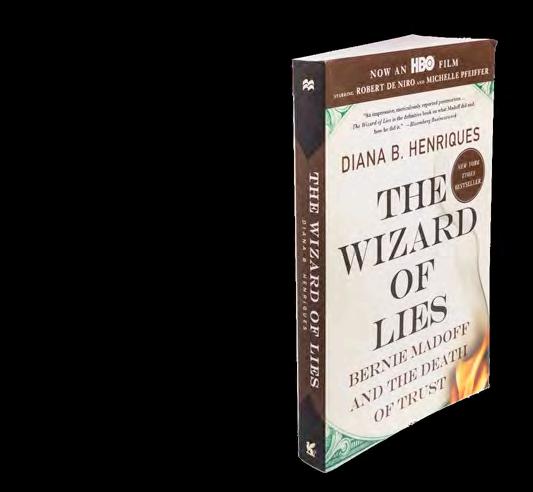
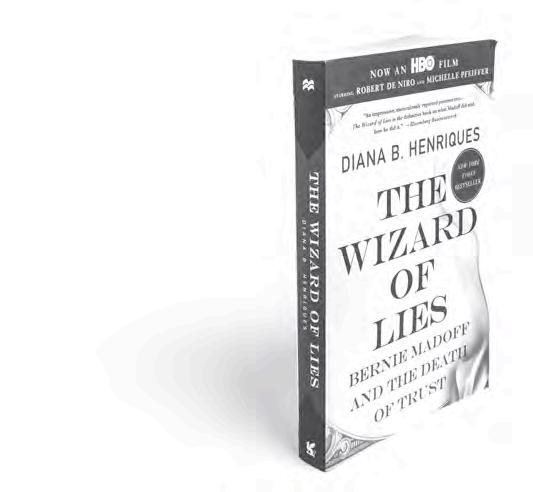 BY DIANA B. HENRIQUES
Reviewed by Jessica Lees, Visiting Assistant Professor of Law
BY DIANA B. HENRIQUES
Reviewed by Jessica Lees, Visiting Assistant Professor of Law
Given the popularity of recent documentaries on financial fraud (for example, Madoff: The Monster of Wall Street on Netflix), now is an excellent time to revisit Diana B. Henriques’s meticulously reported book detailing the Bernie Madoff scandal and Ponzi scheme. Henriques was the first journalist to interview Madoff in prison, and the book reflects her thorough research and discussions with Madoff and other insiders.
I found this book fascinating. Henriques does a deep dive not only into the activities of Madoff and his trading firm but also into the financial forces and regulations that shaped Wall Street from the 1960s through the 2000s. The characters are
colorful, the living is large, and the consequences are real. Henriques’s writing and careful pacing imbues Madoff’s story with just the right amount of tension and drama, as the question of when (and how) Madoff will be caught hangs over the narrative twists and turns. Henriques does not pull punches, and she is not afraid to point out several times the authorities failed to capitalize on opportunities to catch Madoff throughout the years. She also brings to life many stories of those impacted by Madoff’s scheme and their search for justice. This is a great book for students of the law as well as for those interested in understanding more about our financial system.
BYU Law’s annual Law and Leadership Conference in 2023 focused on well-being and featured speakers who shared wisdom on managing the stresses of legal practice. Here is some key advice they shared.
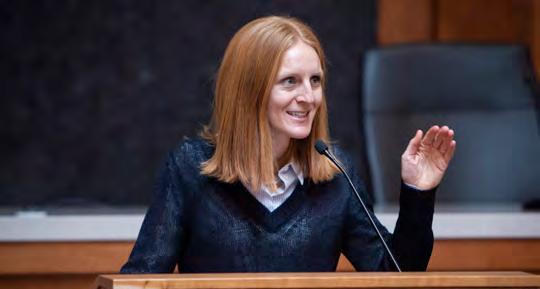
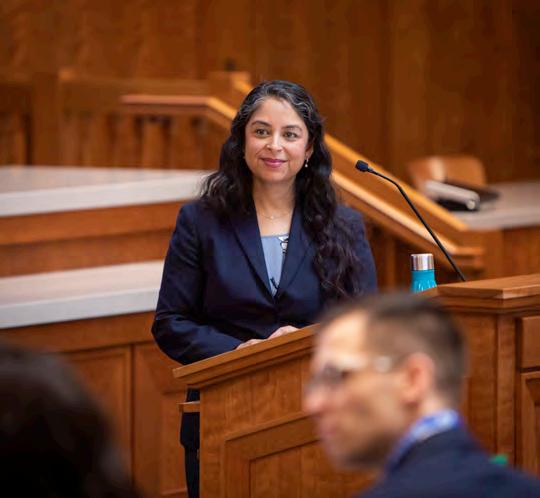
racing heartbeat or stomach butterflies). A pounding heart might not translate as anxiety but rather as anticipation or excitement.
--------------
Steps to mitigate negative stress response in the workplace:
*Be aware of angst inherent in the legal workplace. The profession is rife with heavy workloads and tight deadlines, creating stressors that can be framed as either insurmountable threats or energizing challenges.
*Increase your mindfulness. Leaders who are present, calm, and fair are more likely to appraise situations in nonthreatening ways.
*Hone your emotional intelligence. One way to do this is by developing higher “emotional granularity”—the ability to differentiate slight emotional variations in order to better predict, perceive, and categorize emotion. This makes the brain less likely to deem an emotion as a threat.
*Learn to reappraise stressors. Upon feeling anxiety, deconstruct the experience into its physical manifestation (for example,
*Listen intently. Nonjudgmental listening improves well-being and reduces threat perception.
*Serve someone else and accept service from others. Service can increase levels of the hormone oxytocin, which helps decrease threat perception and fear. Creating a workplace culture of service and connection is among the best antidotes to a stressful environment.
The Honorable Vaino Spencer Chair and Professor of Law at Southwestern Law School
--------------
Self-care advice for attorneys:
*Give yourself grace. Everything might not get done, and that’s okay.
*Think about yourself. Don’t always give priority to others.
*Rely on mentors, especially while juggling evolving personal and professional responsibilities.
*Balance your life by week, by month, and by year.
MARTHA KNUDSON, ’99
Executive Director of the Utah State Bar Well-Being Committee for the Legal Profession
--------------
What good leaders can do to promote well-being:
*Listen. Don’t ignore people or problems.
*Model appropriate behavior. Don’t play favorites.
*Give recognition.
*Offer challenges but clarify the “why” behind burdensome assignments.
*Provide a vision. Communicate institutional goals.
Assistant Professor in the Division of Occupational and Environmental Health at the University of Utah’s School of Medicine
--------------
Tactics to avoid symptoms of depression and anxiety:
*Do the basics: eat well, get adequate sleep, and exercise regularly.
*Focus first on your own behavior.
*Take on a leadership mantle, even if it’s just for yourself.
*Respectfully question, “Is there a better way to do this?”
*Don’t discount the power of individual action. Individuals influence organizational change.
Jamie Bjazevich, ’23, discovered an interest in law when she was 12 years old. “My parents were divorcing and my mom’s attorney was phenomenal— so articulate and yet so compassionate,” she remembers. Bjazevich’s decision to pursue a law degree was solidified when, during high school, she was able to shadow that same attorney. “I realized that my ability to articulate my thoughts and put them in writing would be an asset to the legal profession,” she says.
While at BYU Law, Bjazevich enjoyed working at the US Court of Federal Claims in Washington, DC, and after graduation she was thrilled to be offered two clerkships—one with the US District Court for the District of
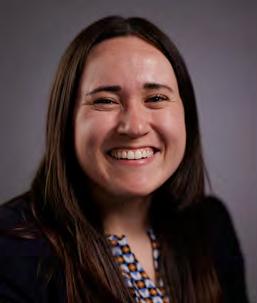
Delaware and one with the US Court of Appeals for the 10th Circuit in Roswell, New Mexico. “Clerkships weren’t something that I anticipated pursuing, but after externing in DC, I was really interested,” she says. “I am grateful for BYU Law’s clerkship committee and for Professor Aaron Nielson. Their guidance on how to navigate the clerkship process was invaluable.”
A highlight of Bjazevich’s law school experience was participating in BYU Law’s IP Moot Court, taught by practitioners from Salt Lake City intellectual property firm Workman Nydegger. The experience honed Bjazevich’s advocacy skills in the context of intellectual property law. “During each class, we practiced presenting oral arguments on cases involving IP issues,” she explains. “It was a challenging thing to do, especially in front of peers, but also very bonding and so much fun. I learned a lot!”
To find balance amid the demands of her law studies, Bjazevich pursues her love for the outdoors and physical activity. “I’ve been able to combine my interests and skills to find a career that is both rewarding and fulfilling,” she says. “I feel so much gratitude for the many people who have been a part of my journey.”
Born to parents from El Salvador, Jonathan Garcia, ’23, is no stranger to hard work and determination. Garcia grew up working in his family’s landscaping and janitorial businesses in Utah. His interest in law was piqued when he interned with the Utah State Legislature during his undergraduate years. After earning a bachelor’s degree in American studies and a master’s degree in writing and rhetoric at BYU, he taught writing courses in BYU’s English Department. But he never lost sight of his dream to become a lawyer. Garcia took the LSAT multiple times and received more than one law school application rejection letter, but his patience and persistence ultimately earned him acceptance to BYU Law.
Participating in his family’s businesses as a child taught
Garcia the importance of working hard, and his internships and experiences at BYU Law have allowed him to channel that work ethic into academic success. Among his accomplishments is taking first place in a competition sponsored by the Hispanic National Bar Association, where he and fellow students Derek Rodriguez, 2L, and Jehicob Torres, 2L, had the opportunity to present oral arguments before Arizona Supreme Court justices. “Winning the 28th Annual Uvaldo Herrera National Moot Court Competition was a capstone experience,” Garcia says. “It was a culmination of my years of teaching, presenting, and writing, and I was able to do it with a team that was just awesome.”
After graduation Garcia will clerk for Justice Gary F. Traynor of the Delaware Supreme Court and then join Wilson Sonsini Goodrich & Rosati in Palo Alto, California, where he will practice corporate law. His journey to a corporate law firm is a testament to the power of education and hard work. “Affinity for business is in my blood,” he says. “Even though I don’t want to take on my own business, that spirit of entrepreneurship is attractive to me. I will be
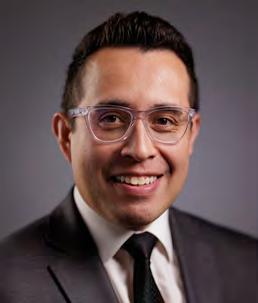
practicing with a law firm that represents a lot of tech entrepreneurs, and that is exciting.”
Although his path to law school was not a straight line, Garcia is confident that pursuing a law degree was the right choice for him. “Rejection has helped me be grateful and humble, and that has been key to my success,” he says. “I am grateful for everyone who has helped me through this process, especially my wife. My mentors here have been amazing. I just feel really grateful.”
to uncover facts and present them in a compelling way to achieve their goals. Both must be skilled communicators, and both require doing research and conducting interviews,” Jarvis says. “In theory, journalists have a responsibility to remain impartial and unbiased in their reporting, while lawyers take on the advocate’s role. I wanted to pursue law so that I could advocate for those in need and bring about positive change in society.”
‘Whether or not I’m here at the clinic tonight helping these people, it’s still happening. I might as well be here on the ground helping out.’”
After graduation Jarvis will join Dentons Durham Jones Pinegar in Lehi, Utah, to practice commercial litigation and family law. He plans to continue volunteering with the Timpanogos Legal Center to be a voice for those who are marginalized or overlooked by society. “Law school has taught me that I can be an advocate and that I can be a powerful influence on people,” he says. “It’s nothing special about me. It’s the inherent ability we all have that can be unlocked through training and education. Considering how competitive it is to get into BYU Law and knowing how many people would love to have that opportunity, I’m incredibly grateful for the opportunity I have had to be here.”
are specially trained to work in a military environment.
Jasperson’s father and brother both served in the US armed forces. Jasperson seriously considered following in their footsteps, but she also wanted to pursue a career in law. When she learned about the Air Force JAG Corps, she knew it was the perfect fit for her. “Air Force JAGs perform a variety of legal work for the Air Force, so I’m not restricting myself to helping clients in one area,” she says. “I could be helping a military member with landlord-tenant disputes, wills and estates, or family law issues. I like that there will be a range of practice areas.”
Jefferson Jarvis, ’23, former BYU track and field star and news media major, developed strong research and writing skills as an undergraduate. His desire to use his abilities in a direct and impactful way led him to pursue a degree at BYU Law. “Investigative journalists and litigators both seek
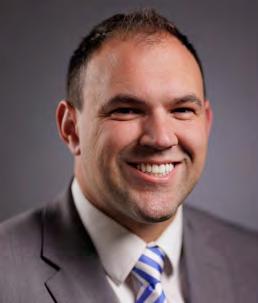
At BYU Law, Jarvis participated in various legal clinics. A highlight was volunteering at the Timpanogos Legal Center with a group of attorneys who provide free legal assistance for people dealing with issues related to divorce, custody, or family law. “Working with attorneys in real-world situations was a really valuable experience,” says Jarvis. “Helping those in need epitomizes the mission of BYU Law, which is to take what we are learning and serve others.” As a husband and a father of two young sons, Jarvis initially worried that working on family law cases would be too difficult, but he found the work meaningful. He explains, “At the clinic, when we had really sad cases with child abuse or a family being torn apart, my mindset became
BYU Law is proud to have produced several graduates who have gone on to serve in the military. CJ Jasperson, ’23, has now joined that elite group. She is excited to serve her country by joining the Air Force Judge Advocate General’s (JAG) Corps, where she will use her legal skills to help service members and their families. The JAG Corps consists of lawyers who
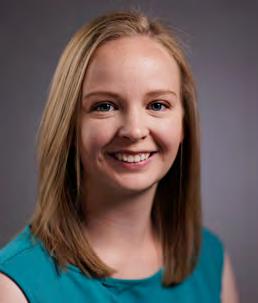
The demands of motherhood also influenced Jasperson’s decision to pursue a career in the Air Force JAG. During her last year of law school, she welcomed her first child, and she knew she wanted a career that would allow her to balance her professional aspirations with her role as a mother. She attended an Air Force event at BYU Law and spoke with JAG lawyers who were doing just that, thanks to benefits like maternity leave and a network of supportive military families.
During her time at BYU Law, Jasperson took a class on gender and legal theory from Professor Kif Augustine-Adams. The class helped her understand the ways in which women are still fighting for equal rights and opportunities. “The class was very eye-opening for me. I hope I can help women realize that they can be on equal footing with men in the military,” Jasperson says. “You can be a lawyer, have a baby, and join the Air Force. If you want to, you can do it all.”
helping those in need epitomizes the mission of byu law, which is to take what we are learning and serve others.
Jefferson Jarvis
Recent BYU Law graduate Chadohl Kang, ’23, has a unique background that sets him apart from his peers. While growing up in Gwangju, South Korea, Kang attended an international school, where he learned English and discovered his gift for writing. He decided that the legal field would be the perfect place for him to combine his writing skills with his desire to make a positive impact on the world. Kang ultimately chose to attend BYU Law because of its strong academic reputation and supportive community.
Law school requires students to master complex legal concepts and apply them in real-world settings. Kang believes that what sets BYU Law apart from other law schools is its broad array of courses on topics such as negotiation, trial advocacy, and alternative dispute resolution. “I took a series of courses from Professor Curtis Anderson, including transactional drafting, which were especially helpful,” Kang says. “In the transactional drafting course, we were presented with fictional cases and learned how to draft documents such as contracts, deeds, and leases from scratch. I found it refreshing to get my hands dirty and learn
about real-world implications and dynamics through these hands-on courses.”
Kang discovered that the key to his success in law school was trying new strategies until he found the ones that worked best for him. “I had always done well in school, but I didn’t do as well as I had hoped in my firstsemester property class. I was really frustrated and didn’t know what to do,” he recalls. Kang was inspired and reassured by hearing professors and other successful lawyers describe obstacles that they faced on their own journeys to success. “I decided to really analyze what was wrong with my exam writing skills, and this process helped me improve my writing and get better grades.”
Law school has been a transformative experience for Kang, and he has learned valuable lessons about perseverance through trial and error. After graduation, he will join Gibson, Dunn & Crutcher LLP in Orange County, California, where he will practice transactional law and use his legal training to help clients achieve their goals and to make a positive impact on the community.
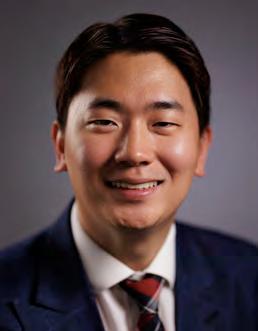
about. A nontraditional student who chose to go to law school while raising five children, Radford knew it would not be an easy road. But with hard work and resolve, she has balanced her studies with the needs of her family.
Danna Radford, ’23, is one BYU Law graduate who has proven that it’s never too late to do something you feel passionate
At BYU Law, Radford quickly found her niche in criminal law and prosecution. She worked in the Salt Lake County District Attorney’s Office, where she witnessed the impact that prosecutors can have on victims’ lives. Radford wants to use her skills and knowledge to be a voice for victims and to ensure that justice is served. “The cases that I worked on in the DA’s office helped me appreciate the importance of seeking justice for those who have been victimized,” she says. “The work criminal defense lawyers do is invaluable for those who need a voice in the courtroom.”
Radford also enjoyed working in the criminal defense and appeals clinic as part of her BYU Law education. The clinic
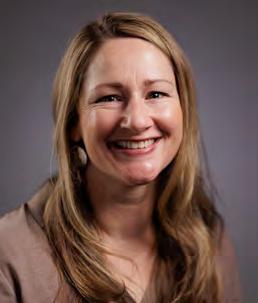
gave her another opportunity to work with real clients, and she helped write a brief and argue a case before the Utah Court of Appeals. The experience was invaluable, as it gave her a taste of what it would be like to practice criminal law.
Radford’s experience as a mother has taught her the importance of collaboration and teamwork, both in her personal life and in law school. She is grateful for the support of her husband, family, friends, and colleagues as she has cared for her family and pursued her education. After graduation she looks forward to continuing her legal journey with the Salt Lake County District Attorney's Office, where her unique perspective and life experience will make her a valuable member of the legal community. “It’s never too late,” Radford says. “If you really feel passionate about something, you can achieve it, regardless of where you are in life.”
it’s never too late. if you really feel passionate about something, you can achieve it, regardless of where you are in life.
Danna Radford
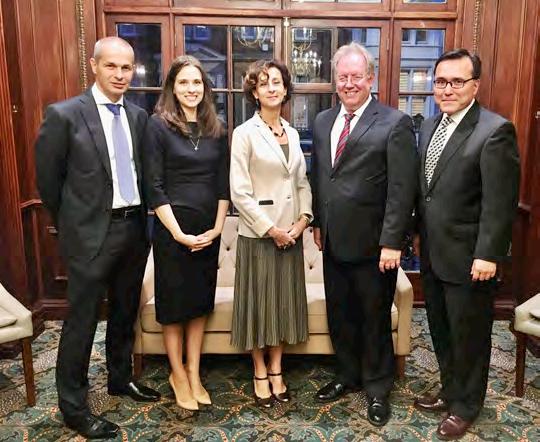 BY CHARLOTTE STEINFELD
JRCLS Chapter Relations
BY CHARLOTTE STEINFELD
JRCLS Chapter Relations
Council member for Europe, the Middle East, and Africa and outgoing chair for the JRCLS UK and Ireland Chapter
The J. Reuben Clark Law Society (JRCLS) is a truly global organisation. The year 2023 will mark 35 years since the first JRCLS chapter was created in Washington, DC.
JRCLS has gone from strength to strength in the intervening years, growing to over 160 chapters worldwide, including 130 professional chapters and many student chapters. These chapters focus on serving marginalized communities, supporting peers, reaching out to friends of other faiths, maintaining professionalism, and strengthening faith.
JRCLS has seen steady expansion in Europe since the first European chapters were founded in 2002 (London, England) and 2006 (Frankfurt, Germany). Chapters followed in Moscow, Russia; Geneva, Switzerland; and Lisbon, Portugal. Now, more than 20 years after the London Chapter was formed, new chapters are being established in France, Denmark, Belgium,
the Netherlands, and Spain, marking a new dedication to service and outreach in these countries. The JRCLS London Chapter helped pave the way for this expansion.
During its first decade, the London Chapter held many speaking and networking events, usually at BYU’s London Centre. These events attracted the few Latter-day Saint lawyers and law students based in
I was among those who attended this event. As a London-based English barrister, I was thrilled to join the vibrant and impressive JRCLS. I was later invited to become chair of the growing London Chapter and began to expand its boundaries to include those living in Ireland, Wales, Northern Ireland, and Scotland. In 2013 the London Chapter was reorganised and renamed the UK and Ireland Chapter. Its first event as a reorganised group commemorated JRCLS’s 25-year anniversary and was attended by Elder Jeffrey R. Holland, member of the Quorum of the Twelve Apostles and former president of Brigham Young University. The event was standing room only, which both astonished and heartened former chapter leaders. Over the next decade the chapter continued to grow, expanding from a handful of participants to more than 200 members across the UK and Ireland.
England. Then, 10 years after the London Chapter’s creation, a pivotal moment arrived when Elder Lance B. Wickman of the Church’s Office of General Counsel came to the BYU London Centre to speak about a Church legal case that had reached the UK House of Lords (now the UK Supreme Court). Lawyers from across England attended Elder Wickman’s address, learned about JRCLS, and subsequently joined the London Chapter.
Today, UK and Ireland Chapter members represent a broad spectrum of professionals, such as judges, magistrates, barristers, solicitors in private practice, law students, and industry and local government members. UK and Ireland Chapter members have engaged with the All-Party Parliamentary Group (APPG) on International Freedom of Religion or Belief, a cross-party group of parliamentarians who believe that freedom of religion or belief is a human right, and with the APPG for Foreign Affairs. Members have also represented JRCLS at international ambassadorial receptions, facilitated cooperation with Latter-day Saint Charities, and worked with the AMAR
Foundation, which seeks to rebuild and improve communities in war-torn areas.
Seeking ways to discuss and promote religious freedom, the UK and Ireland Chapter established the Annual Religious Freedom Lecture (ARFL) series, which has been held at the BYU London Centre since 2015. Speakers for the ARFL series have been selected from across the faith spectrum and have included:
f Mohammed Amin MBE, who shared “One Muslim’s Perspective on Religious Freedom.”
f Judge Marta Cartabia, vice president of the Italian Constitutional Court and a practicing Catholic, who delivered the remarks
“The Many and the Few: The Case for Religious Accommodation.”
f Elder Quentin L. Cook, who spoke about religious freedom and the Magna Carta.
f Neville Rochow SC, a leading Australian barrister, who presented “Freedom of Conscience—Déjà Vu or Something New?”
These lecture series speakers have been both enlightening and educational, and participants have forged many new friendships both within and outside of their faith circles.
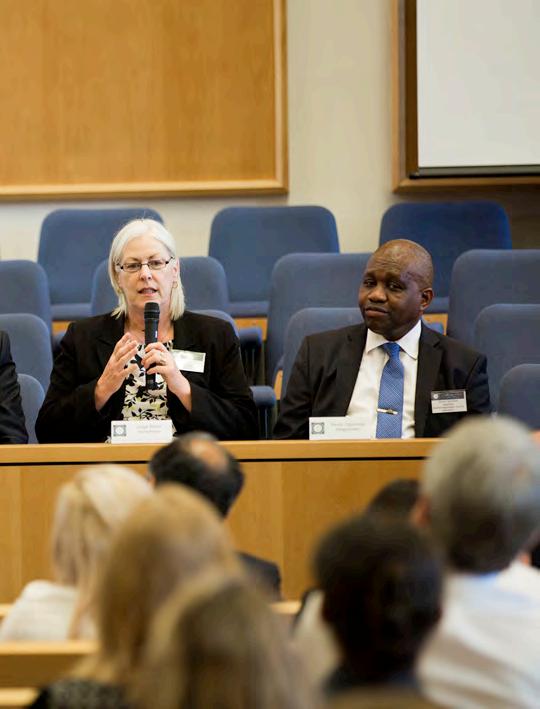
Furthermore, the hand of friendship has been extended outwards. The ARFL has welcomed friends and colleagues from other faiths, including the late Lord Mohamed Sheikh, the first Muslim Conservative peer (UK House of Lords); Baroness Elizabeth Berridge, British Conservative politician and member of the UK House of Lords; and Aina Khan OBE, renowned family law specialist and marriage law reformer.
The UK and Ireland Chapter grew to become the largest chapter in Europe and was recently split into three separate chapters based on distinct legal jurisdictions: England and Wales, Scotland, and Ireland. Leaders for two of these chapters have already been selected. Christian Taylor, a Cambridge-educated English barrister from Manchester, will serve as chair of the newly created England and Wales Chapter, and Hugh Murphy, an Irish barrister and legal director at Kellogg Europe, will lead the Ireland Chapter. Both are committed to building on the successes of the past decades.
The new Ireland Chapter, England and Wales Chapter, and Scotland Chapter are currently focusing on refugee support and initiatives. The chapters are working with global JRCLS leadership to
consider ways members can support refugees through the Latter-day Saint Charities Friendship Centre in London, a centre supported by the Church that partners with organisations such as the Red Cross to provide English classes and regular social activities for refugees and migrants. This initiative ties into the theme for a forthcoming European regional conference, the first of its kind, which aims to gather lawyers and law students from across the various legal jurisdictions of Europe to explore how JRCLS members can help the many refugees and displaced persons who have flowed into Europe in recent years.
These are exciting times for JRCLS in Europe. However, European chapters must work
together to overcome many practical challenges, including facilitating cooperation among lawyers who practice within different legal systems and speak different languages. The historic obstacle of gathering given our widespread membership has greatly improved with virtual gatherings. The ability to assemble online will be vital to the strength and success of new chapters whose membership spans great distances. Similarly, translation tools are increasingly user-friendly and can play an important role in helping members communicate. It will be crucial in the years ahead to build a committed group of lawyers who can hold out the hand of friendship to lawyers of other faiths and serve those in need within their local communities and throughout the world.
It will be crucial in the years ahead to build a committed group of lawyers who can hold out the hand of friendship to lawyers of other faiths and serve those in need.
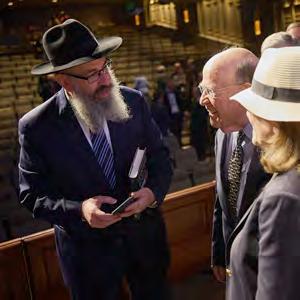
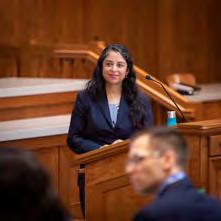
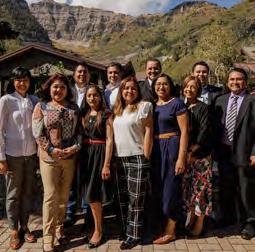
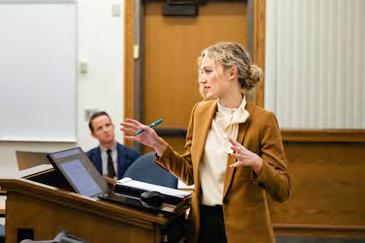
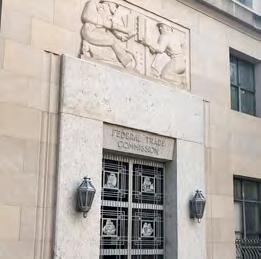
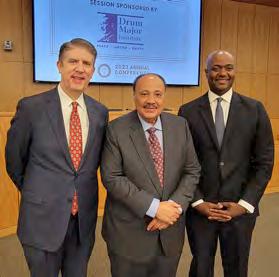
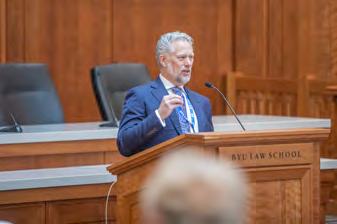
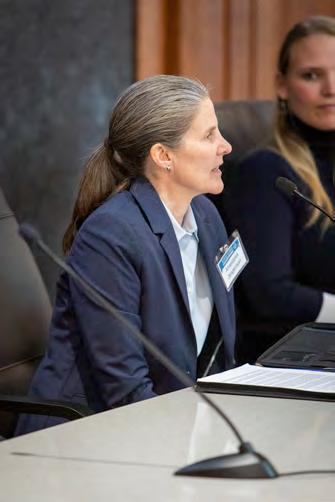
SEPT. 29–30, 2022
JRCLS Leadership Conference
JUNE 16, 2022
Religious Freedom Annual Review
OCT. 1–5, 2022
ICLRS International Law and Religion Symposium
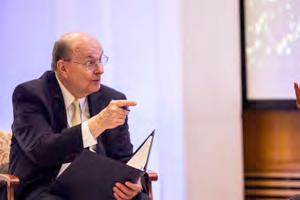
JUNE 9–10, 2022
JRCLS Annual Conference, Salt Lake City
JAN. 27, 2023
Law and Leadership Conference
OCT. 21, 2022
Future of Antitrust Conference, Washington, DC
MARCH 2–4, 2023
JRCLS Annual Conference, Atlanta, Georgia
APRIL 28, 2023
Future of Antitrust Conference, Brussels, Belgium

APRIL 9, 2023
Winter Deals Conference
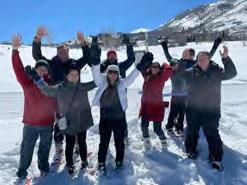
MARCH 17, 2023
State and Local Government Conference
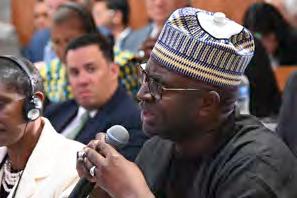
MARCH 31, 2023
Empirical Legal Studies Conference
BYU Law is leading the application of corpus linguistics to legal interpretation and analysis by producing scholarship and research tools, including the Corpus of Founding Era American English (COFEA).
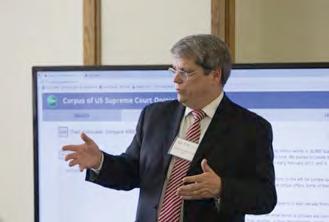
Professor Stephanie Plamondon brings insights from neuroscience to shape scholarly discussions of innovation and intellectual property law, including work examining poverty’s impact on creative decisionmaking and questioning IP’s role in promoting distributive justice.
Professor Matthew Jennejohn analyzes patterns in the development of innovative contractual structures, which helps explain how complex business transactions contribute to economic growth.
As a pioneer in the field of disaster law, Professor Lisa Grow writes about disaster preparation, mitigation, and response, exploring how popular misconceptions about human behavior during disasters and the importation of national-security and war rhetoric have adversely a ected disaster law and policy.
